Warcraft Retrospective 30: Inspector Maievert
Before we move on to The Frozen Throne, I should point something out: World of Warcraft was already long in development by the time the original Warcraft 3 shipped. The book The World of Warcraft Diary: A Journal of Computer Game Development, by Johnathan Staats, helped me appreciate just how far into development it was. Warcraft 3 and WoW were developed in parallel, and they piggybacked off each other’s worldbuilding. This might explain, somewhat, why there are some inconsistencies between them, both factual and thematic: the Warcraft 3 story went through a number of iterations, which were costly to change by the time WoW shipped.
It might also explain why Warcraft 3 didn’t feature the southern Eastern Kingdoms, the territory of the human kingdom of Stormwind. These zones were the first ones made in WoW, and perhaps the Warcraft 3 developers wanted to leave the WoW developers some breathing room instead of setting things in stone.
By the time Reign of Chaos went gold, the roster of playable races in WoW was already decided, and preliminary models made. There were in fact more of them planned, but cut for aesthetic or technical reasons. One such race we’re about to see: while originally created for WoW, it was introduced in The Frozen Throne first.
TFT, riding off the phenomenal success of the base game, was made in the record time of nine months. Because of this, they cut some corners in the campaign, and only two cinematics were made, compared to Reign of Chaos, which had seven.1 A shorter development cycle also meant that not all rough spots of the story could be ironed out.
And since the broad strokes of WoW were decided by the time TFT began development, any inconsistencies with it are on the writers. They have no excuse that the other game changed things.
Terror of the Tides
Going into TFT straight after the original, you might be eager to have a lot of questions answered about what happened next. Questions like…
- How are Thrall and Jaina settling in in Kalimdor?
- How are the night elves recovering from the Legion invasion?
- What will be Arthas, Kel’Thuzad, and the Lich King’s next moves?
- What has been happening back in Lordaeron during the invasion of Kalimdor?
- What happened to Illidan?
The new campaigns answer all these questions, and more.
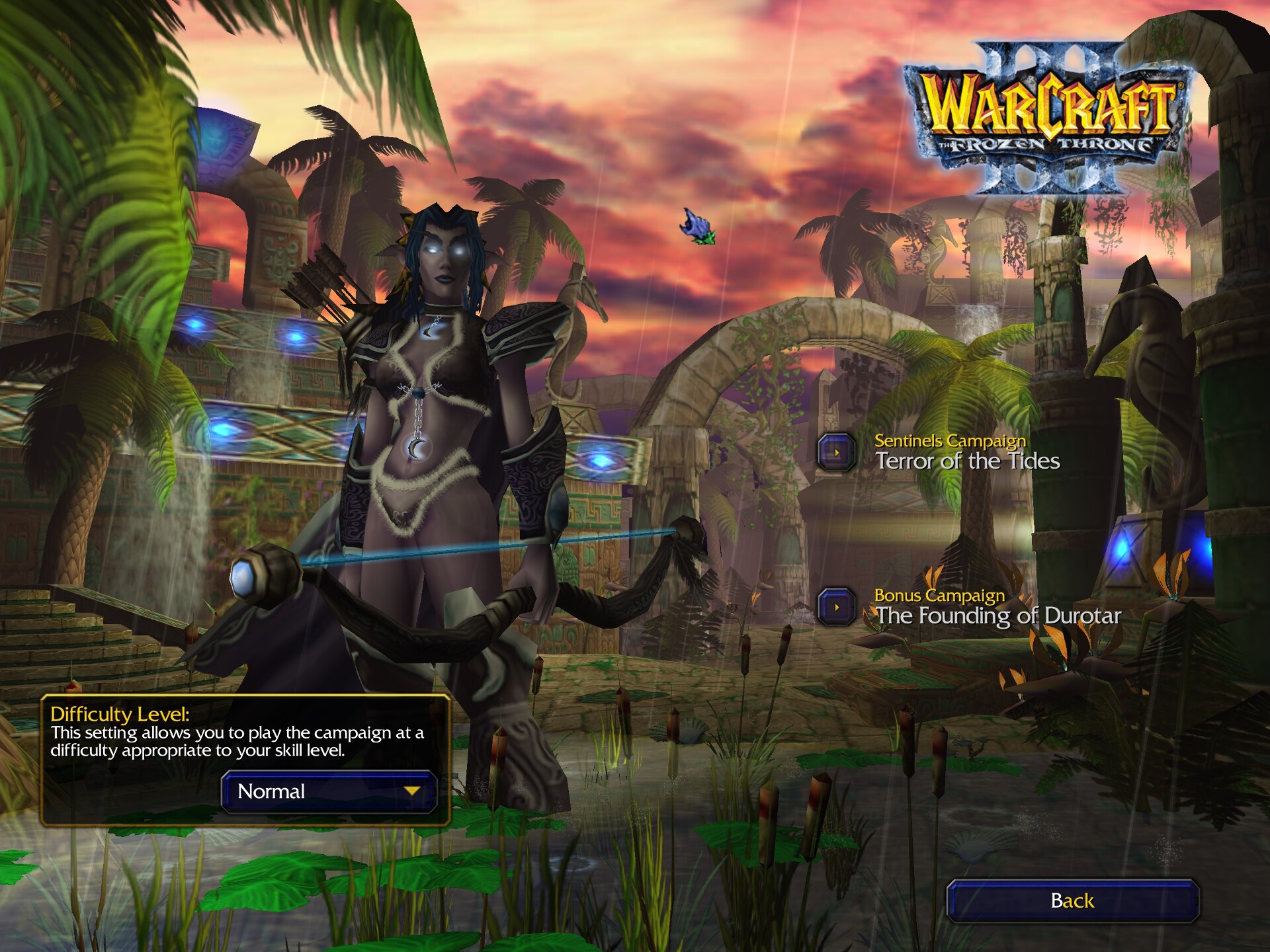
Just like Starcraft finished with a protoss campaign, and then its expansion Brood War opened with a protoss campaign, here we begin the new story with the same faction that ended the previous one: the night elves.
The short descriptions of TFT campaigns are made of lies, damn lies, and half-truths. We’re heading into a supposed “Sentinels Campaign”, but the first half of it will be spent playing a new night elf faction called the Watchers. In the “Alliance” campaign, we won’t be playing the Alliance; in fact the game lacks a proper Alliance campaign. Finally, half of the “Scourge” campaign is dedicated to a budding splinter faction of the Scourge.
What about the Horde? They’re doing their own thing, not connected to the main campaign. That’s what the “bonus campaign” is about, and I’ll get to it later.
Continuing the proud tradition started by Ner’zhul in Beyond the Dark Portal, Illidan is the character who escaped the events of the previous game to usher in the events of this one. He has reverted somewhat from his full shadowy Metamorphosis appearance, combining his original night elf look with demonic horns and wings; a look that has now become iconic. In his mind, he’s not the Betrayer; he was the one who was betrayed. He summons a magic storm, and deep under the sea, serpent-like beings awaken and heed his call.
Thus begins the…
Rise of the Naga
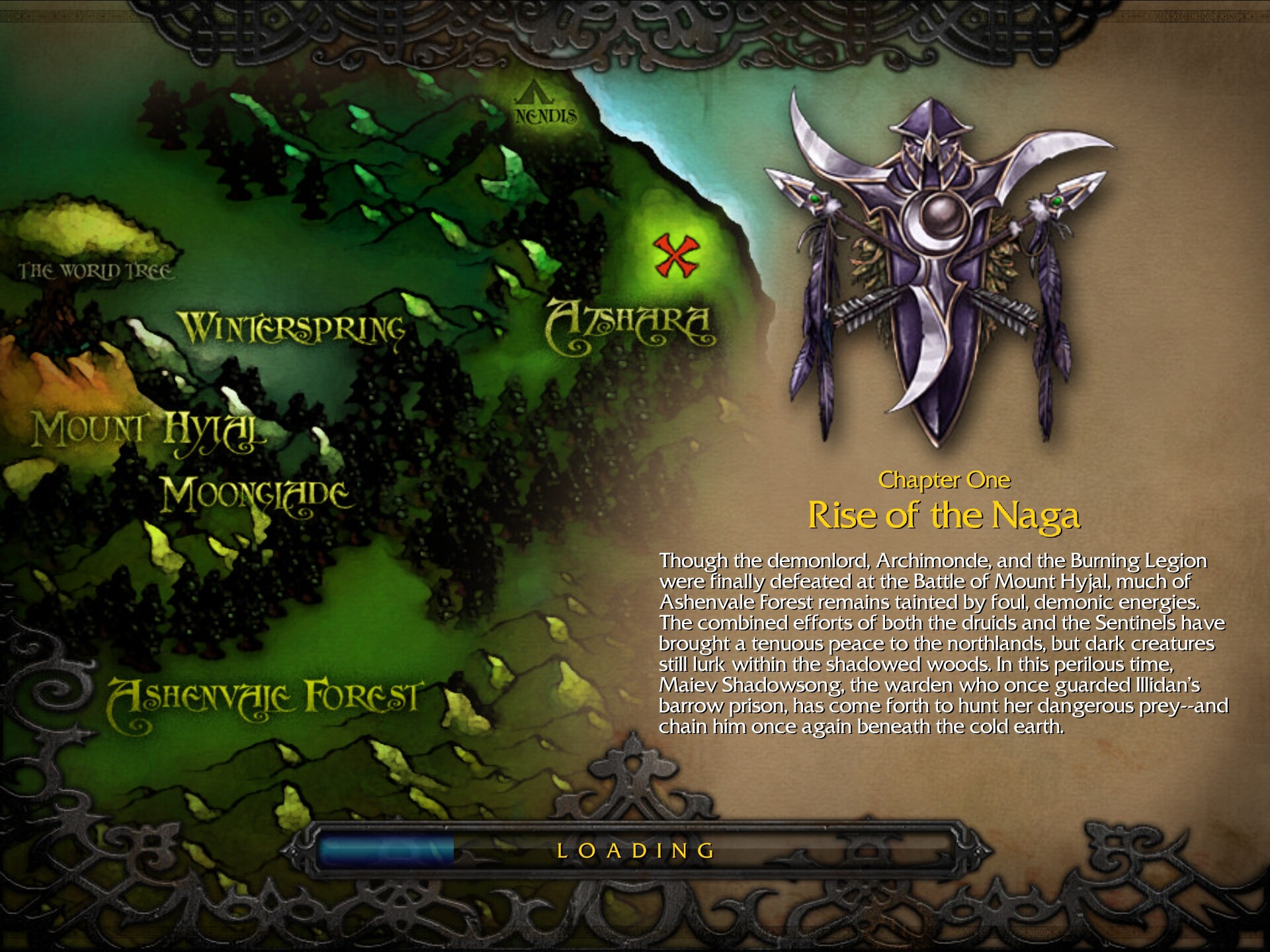
Kalimdor. A land of mystery, history, and opportunity, newly discovered by daring explorers from across the sea. What dungeons undelved, tomes of lore unread, and peoples unknown does it hide? Ever eager I was to return to it, getting excited to see it featured in the expansion, before learning how many missions of the main storyline take place there.
Turned out it’s exactly one.
The story is thus. Illidan has blazed his way across the forest, and I mean literally blazed, leaving flaming tracks in his wake. He’s being chased by the night elf Watchers, led by our new hero: Maiev Shadowsong, the Warden. And I’m sorry, I need to gush about her for a minute because everything about her is just so cool.
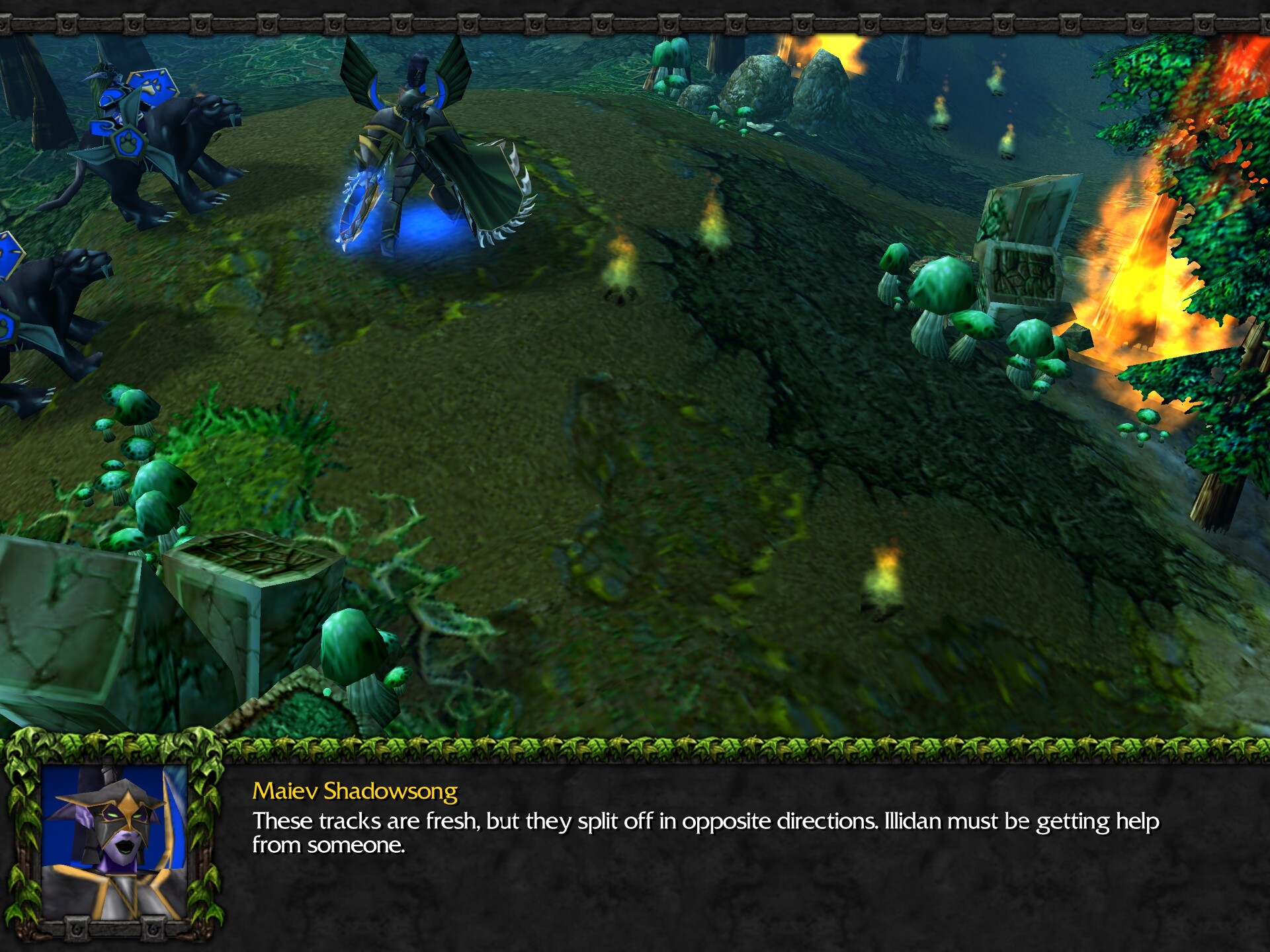
Her visual design is cool. Her voice is cool. Her sense of authority is cool. She continues the “harsh and unforgiving” tradition of female night elf leaders pioneered by Tyrande, but she’s actually knowledgeable, inquisitive, and mostly competent. At the beginning of the story, Maiev is Justice personified, as the night elves understand it: uncompromising and unrelenting. It’s not that she hates Illidan per se, but he’s a very dangerous escaped criminal who needs to be recaptured.
We also get a new music theme — perhaps the most iconic night elf theme of all time. In Reign of Chaos, the music themes were more subtle; in TFT, they’re bolder, more noticeable, and more upbeat.
After shattering the gate, we come upon a ruined night elf village, with burning houses and corpses strewn everywhere. So they do have civilians and permanent settlements after all!
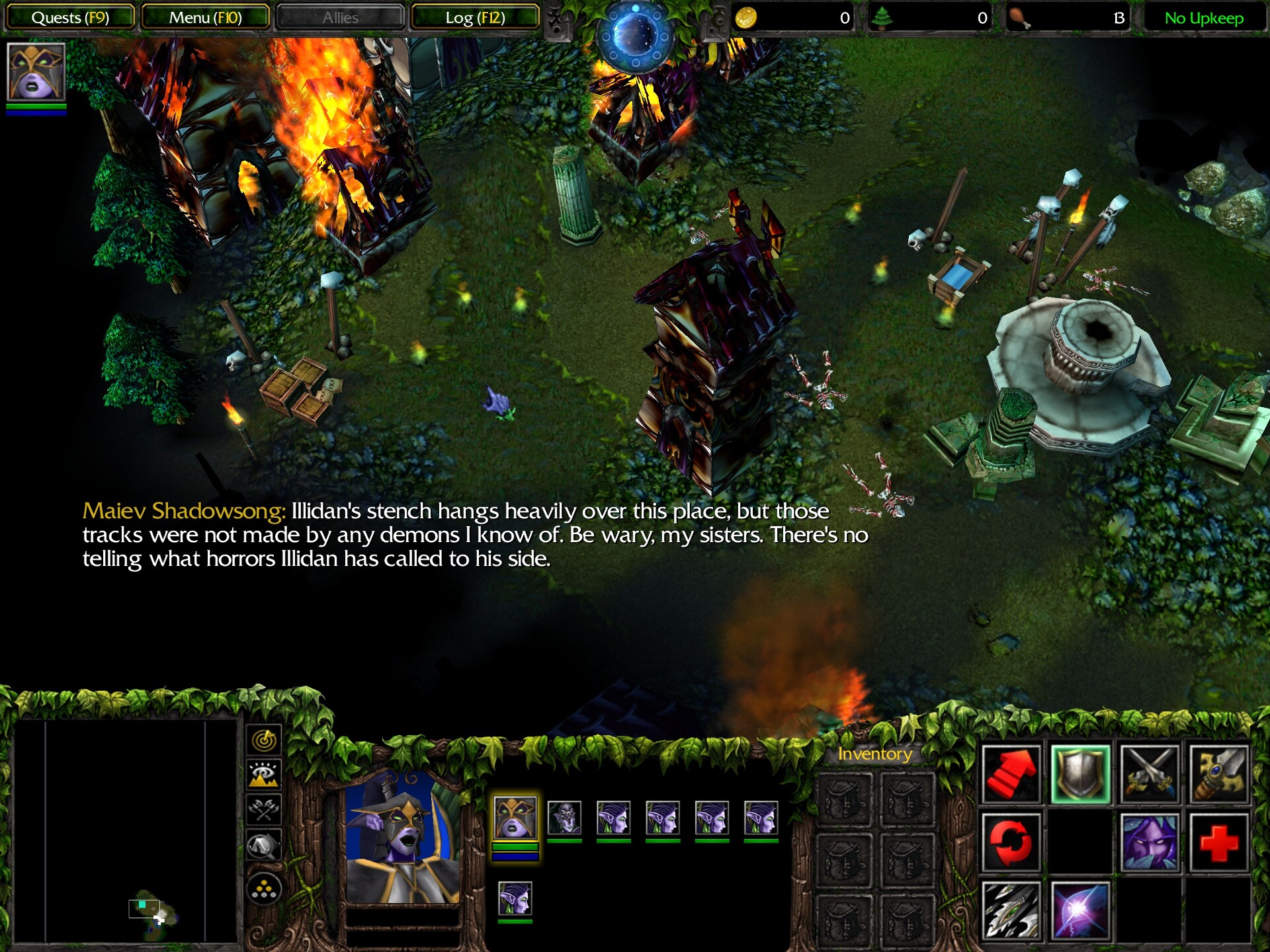
In TFT, each faction got a fourth hero, and we get to play that hero in that faction’s campaign. As a Warden, Maiev starts with two abilities: Fan of Knives, an AoE attack that sends knives flying outwards from her position, and Blink, a short-range teleport not unlike D&D’s Misty Step (though way predating it). For the first time in all of Warcraft 3, we control a hero with an innate teleportation ability, and the map designers went wild with the possibilities.
It’s worth breaking every crate, exploring every corner, and blinking to every single patch of land that can be reached: these often contain secrets. The first such secret, only reachable by Blink, is a chain of islands populated by fish people called mur–
Mur’gul?
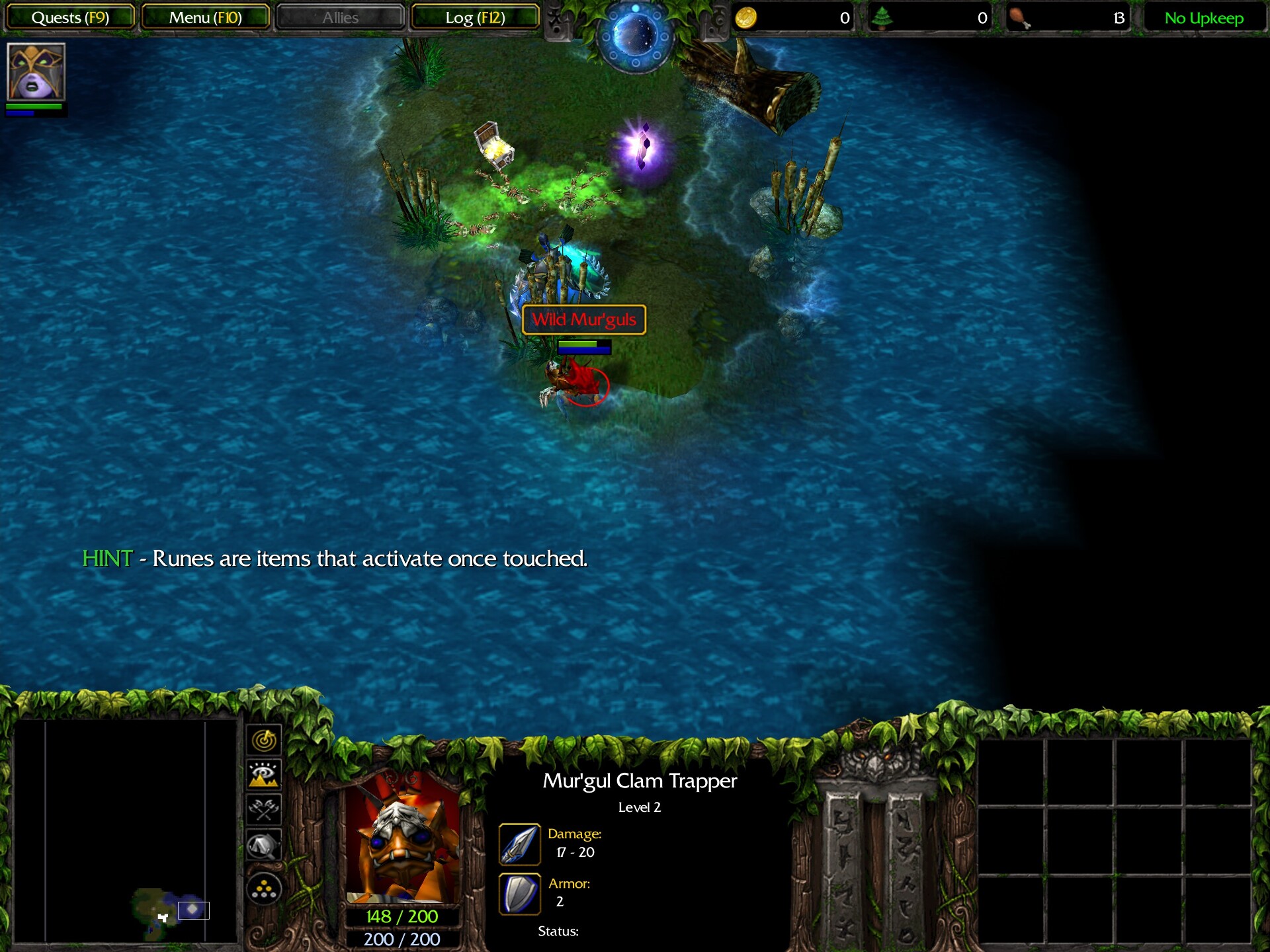
Welcome to the first of the unexplained renames. In TFT, murlocs are not found anywhere in the new campaigns. In their place are mur’gul, who look like more monstrous murlocs with spikes growing out of their backs instead of fins. The weird part is that it’s not acknowledged by WoW, which has plenty of murlocs, but no mur’gul whatsoever.
Next is a tribe of corrupted furbolgs who cannot be saved, and whom we put out of their misery.
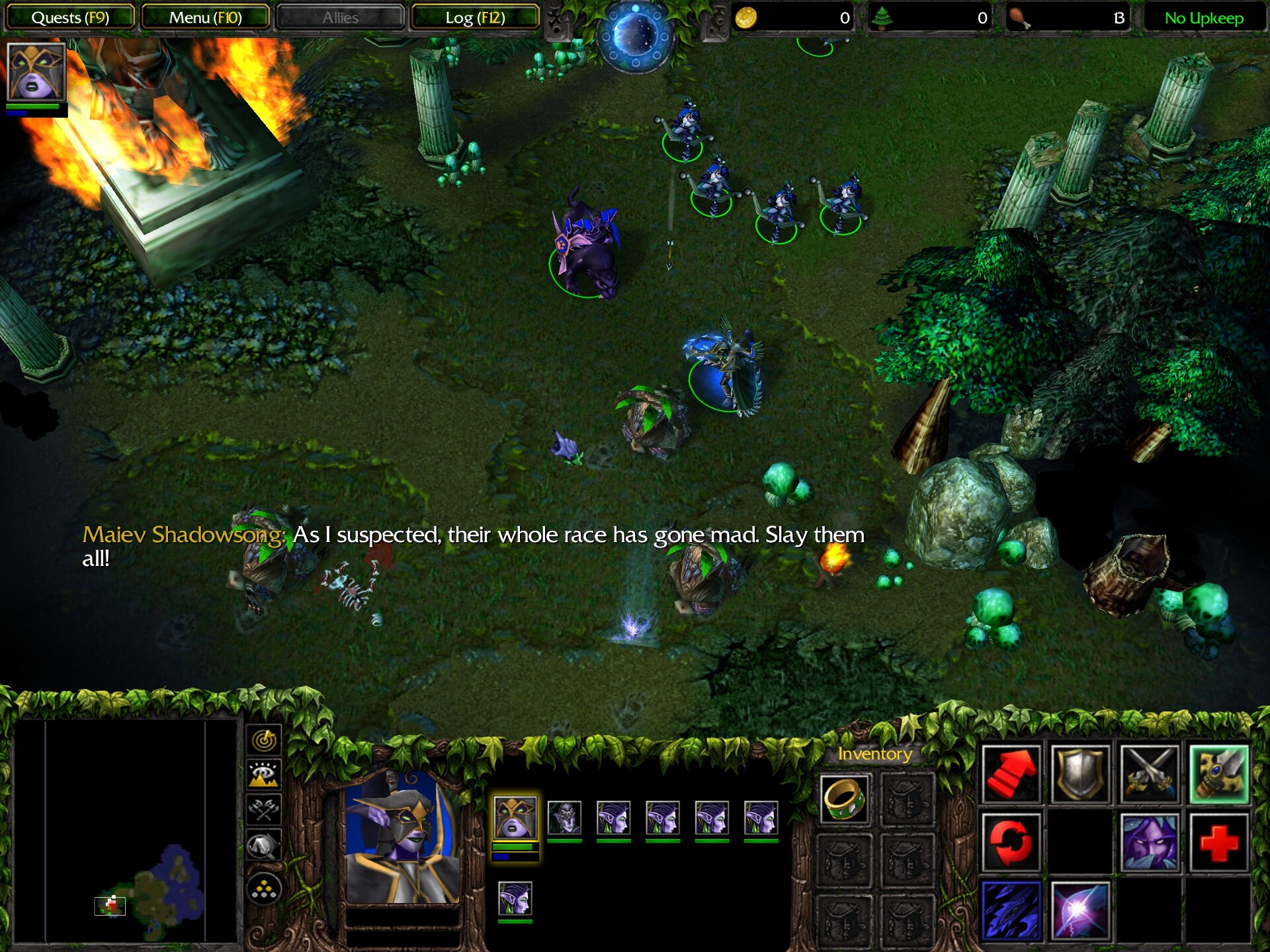
That big huntress, by the way, is no regular huntress: her name is Naisha, and she’s a special unit, Maiev’s first lieutenant and perhaps the closest thing she has to a roommate best friend. You’re not required to keep her alive, but if she dies in gameplay, the story still continues as if she survived every mission.
Soon we get our first side quest. Maiev meets the survivors of one of her scout teams, who were attacked by a berserk owlbear… sorry, wildkin.
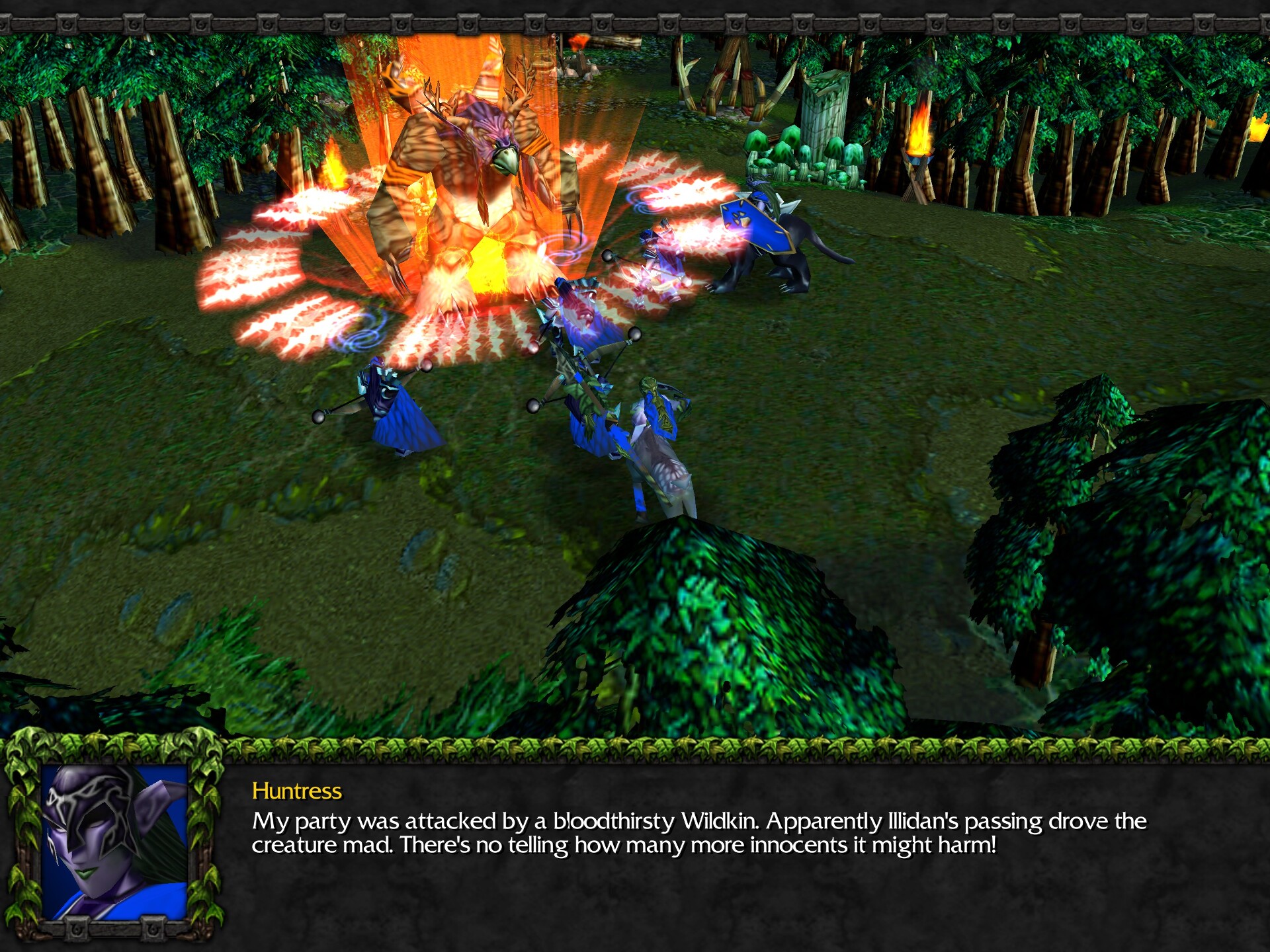
Between RoC and TFT, a few unit names inexplicably changed, often alongside their models. The night elf ballista was replaced with the glaive thrower, the orc catapult with the demolisher, and the human gyrocopter and steam tank with the flying machine and siege tank siege engine. And owlbears became wildkin. It’s speculated that it was done for trademark reasons, and indeed gyrocopters and steam tanks might have been renamed to avoid clashes with Warhammer Fantasy, but ballistas and catapults? These are generic terms!
After killing the wildkin, we encounter the serpentine race from the cinematic, busy burning another night elf village and the ships in its harbor.
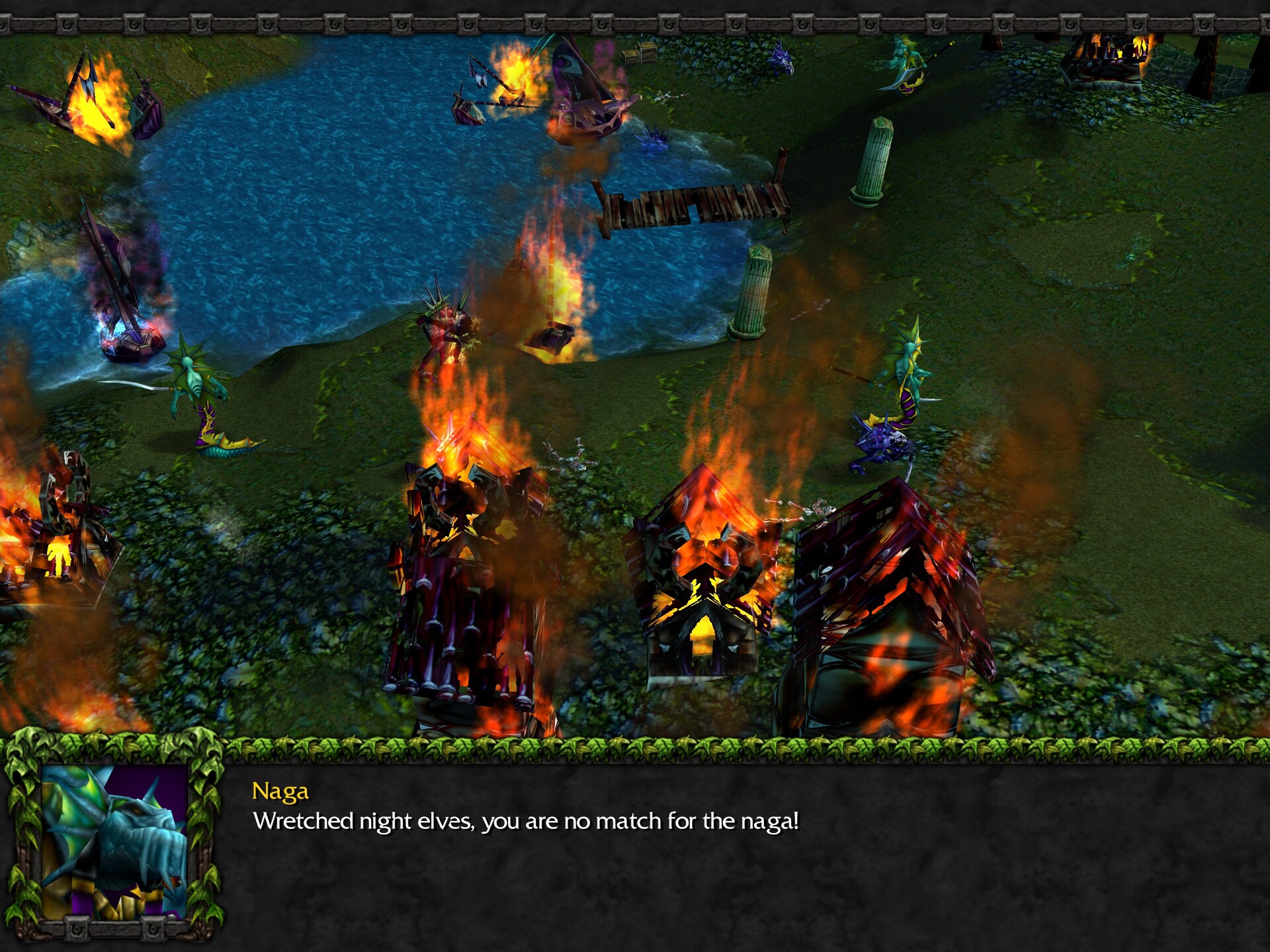
Maiev counters: “Naga? Many craven races have tempted our wrath over the centuries. None have survived!” I sure wonder what these races were and how many accounts of genocide the night elves have committed. It’s not like they’re going to retcon that, right?
Next we rest at a Fountain of Health, where the army, once again, stands idle while Maiev blinks atop the waterfall, killing spiders and taking their stuff.
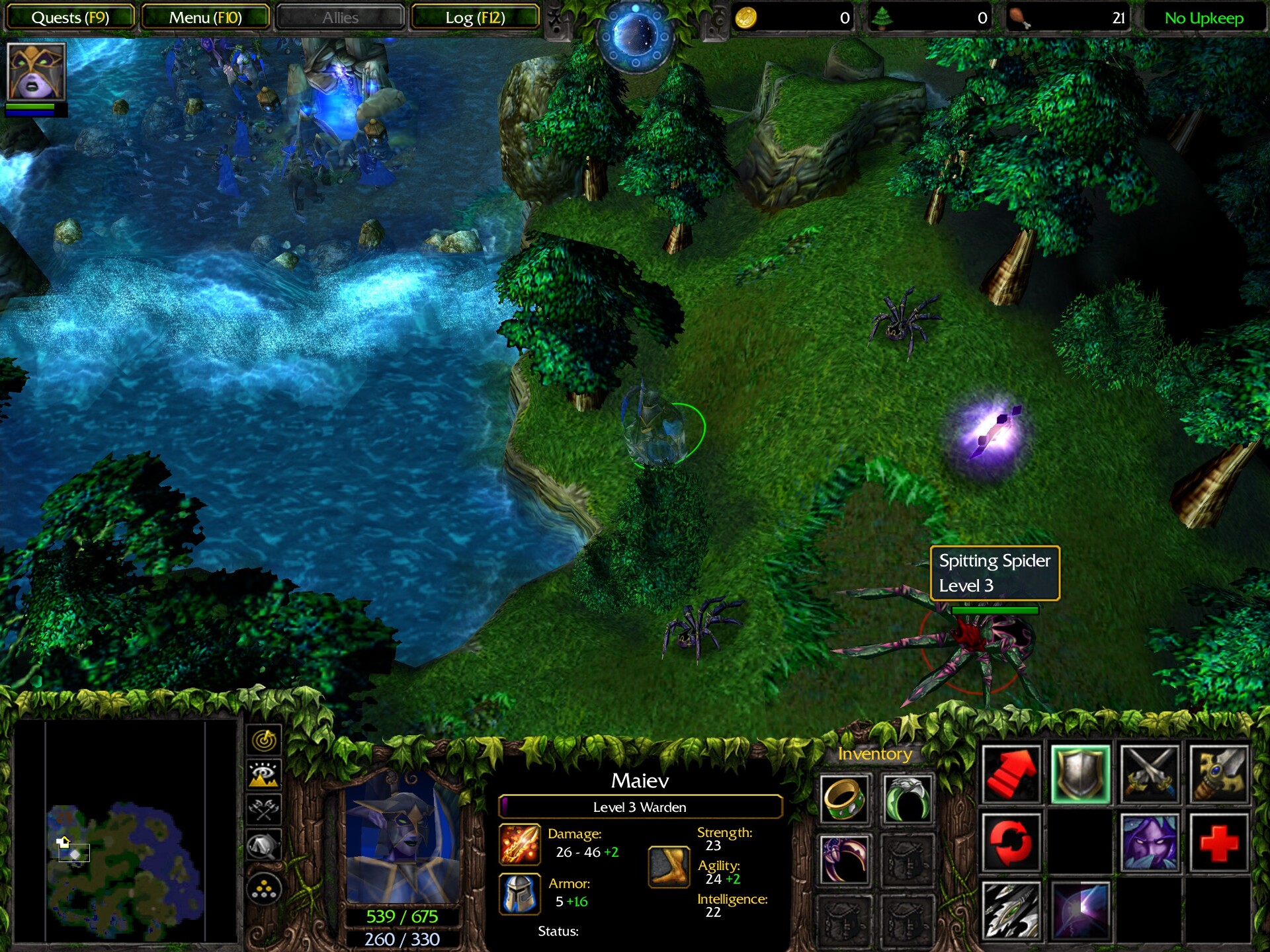
In another side quest, we rescue night elf warriors captured by satyrs, who, curiously, allude to serving some kind of “master”. Are they Illidan’s followers as well? That’s weird.
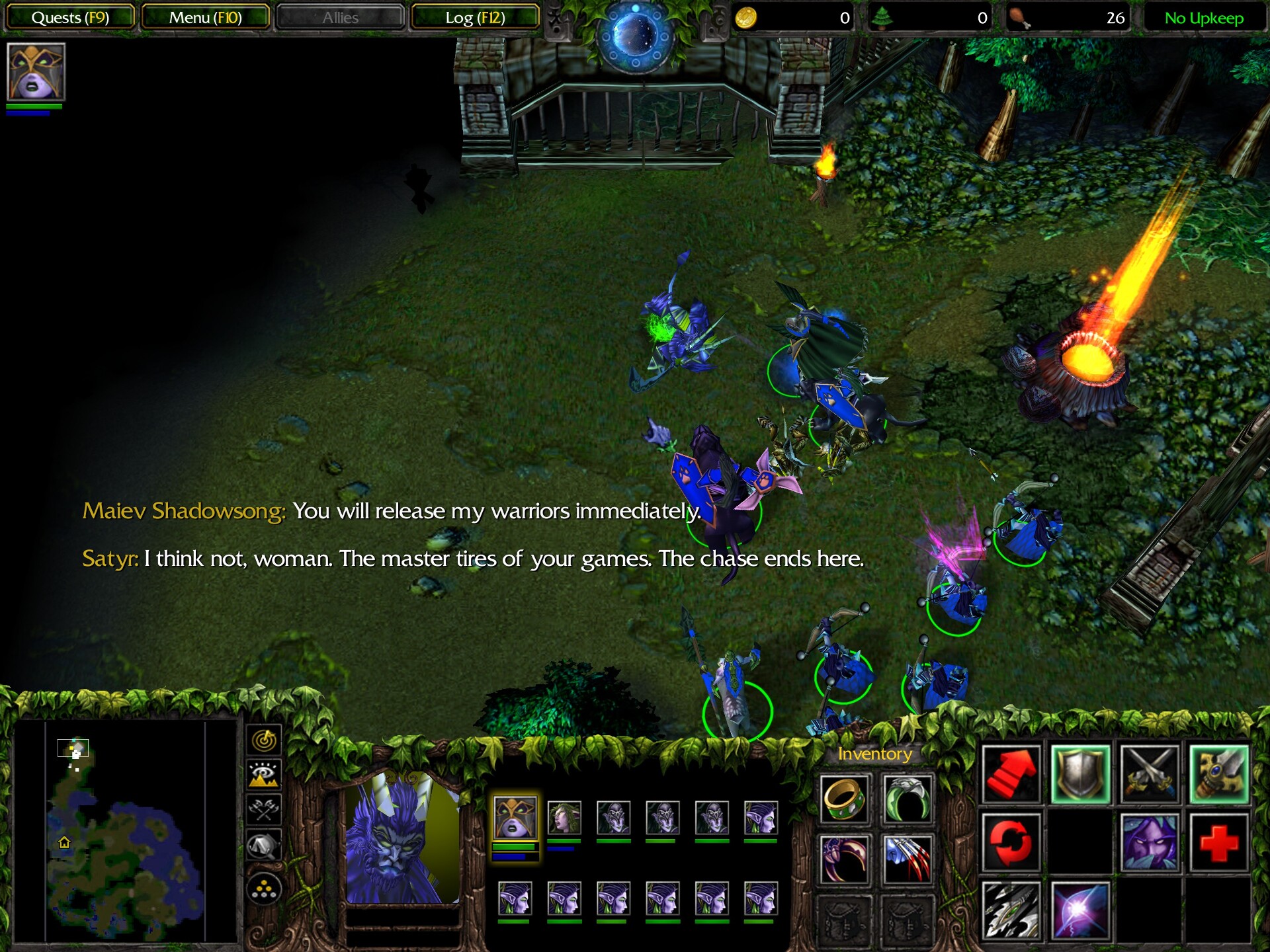
We reach another gate, and the game is kind enough to warn us (through Maiev) that it’s a point of no return. Something is brewing on the other side, where the port of Nendis2 lies.
That something turns out to be Illidan and more naga, who are burning the ships while their master steals commandeers one and sails away.
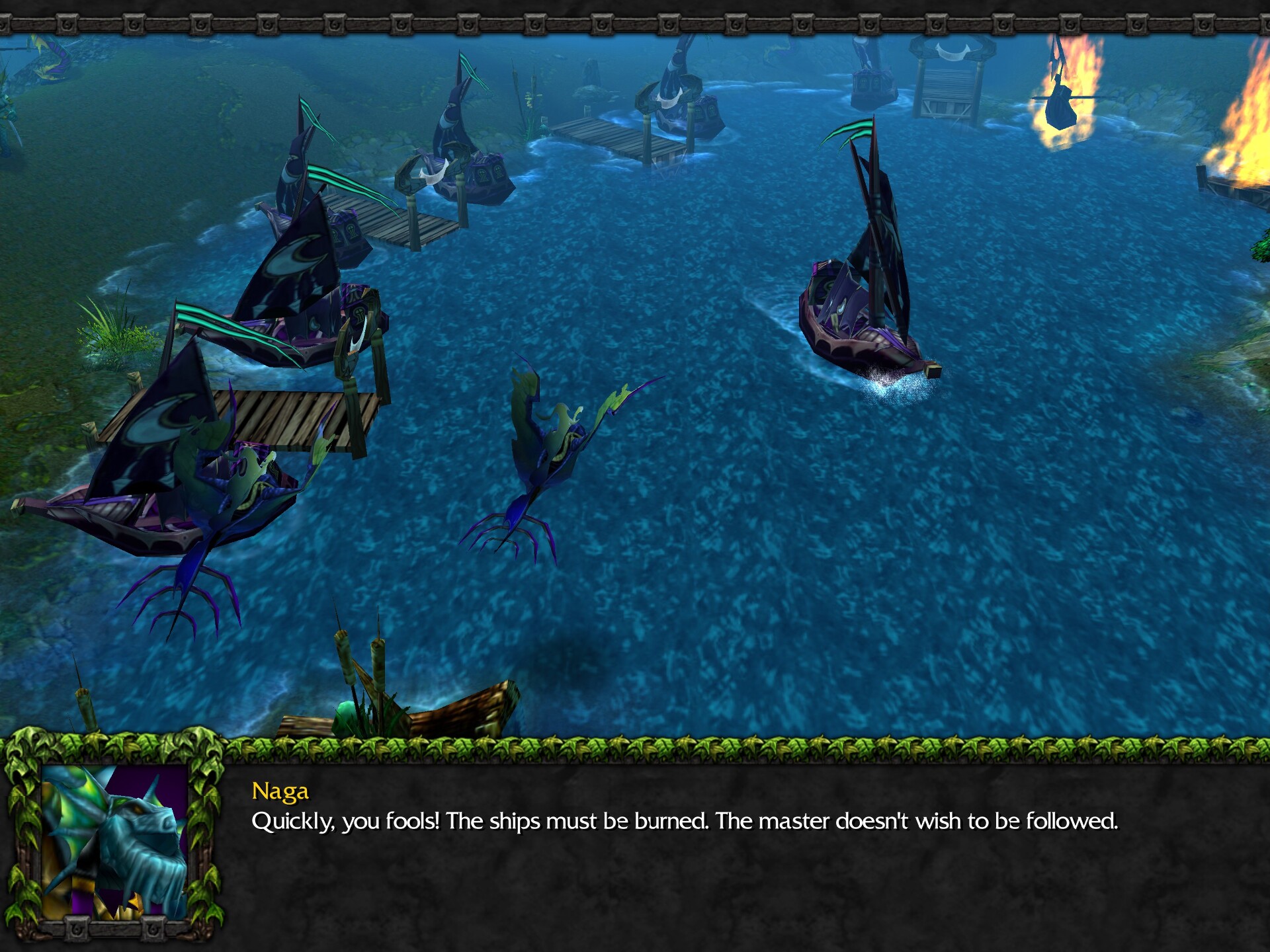
It’s an easy-to-miss point, but it shows Illidan had a reason, albeit a twisted one, to leave all this destruction in his wake. He wasn’t slaughtering random civilians for evil’s sake; he was targeting specifically coastal towns, and burning the ships docked there, to ensure he couldn’t be followed by sea. Which is still evil, mind you.
We have to save at least two of the remaining ships to pursue him. Once we do, the mission ends.
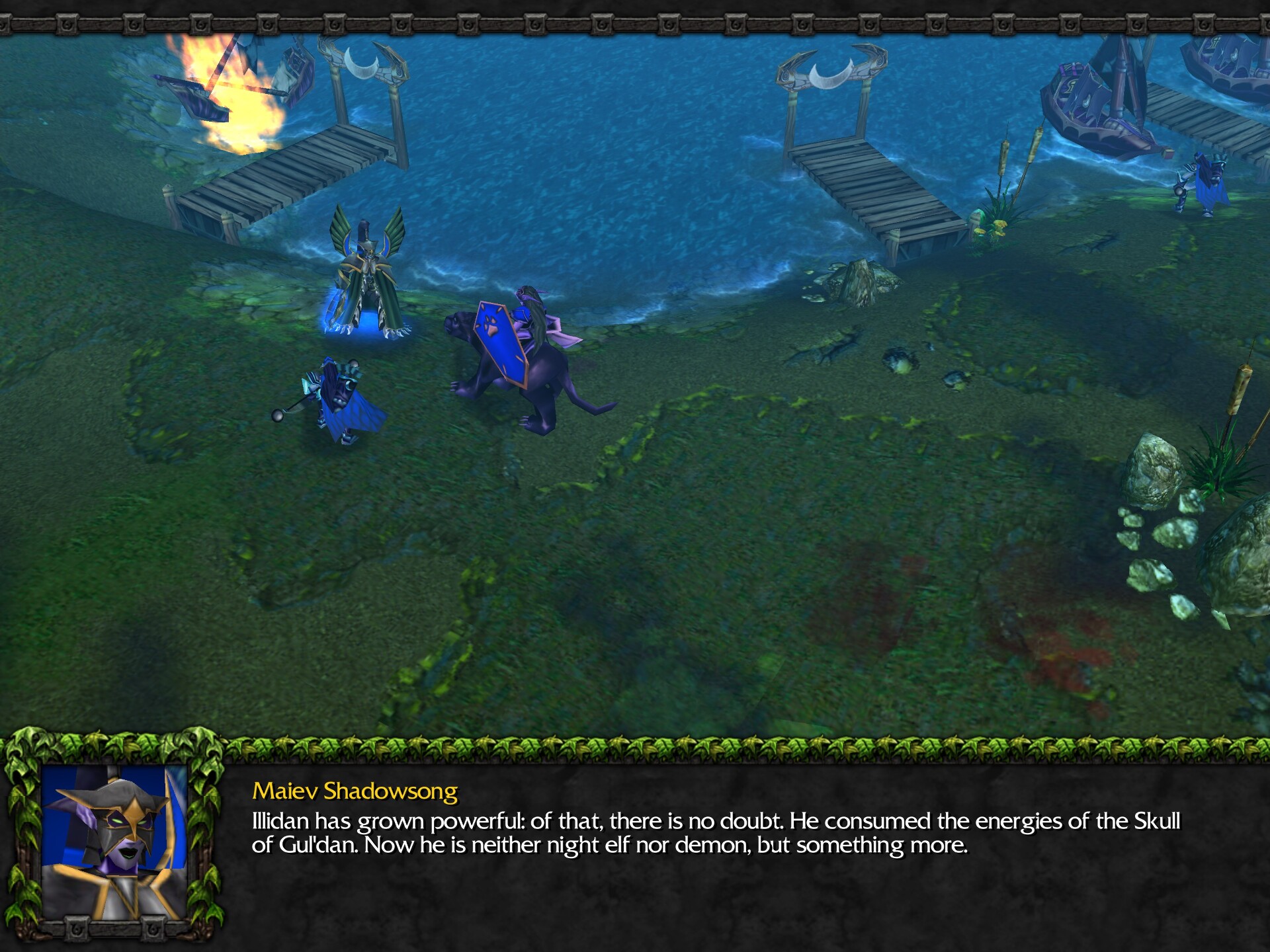
Maiev dodges Naisha’s question of whether they can actually defeat Illidan even if they find him, only saying that they must trust time to reveal all things. I like how everyone just uses the term “night elf” as if it’s a single inseparable word, resulting in some awkward phrasing.
Heave away, cast off bow line, and set the mainsail! We’re setting a course for…
The Broken Isles
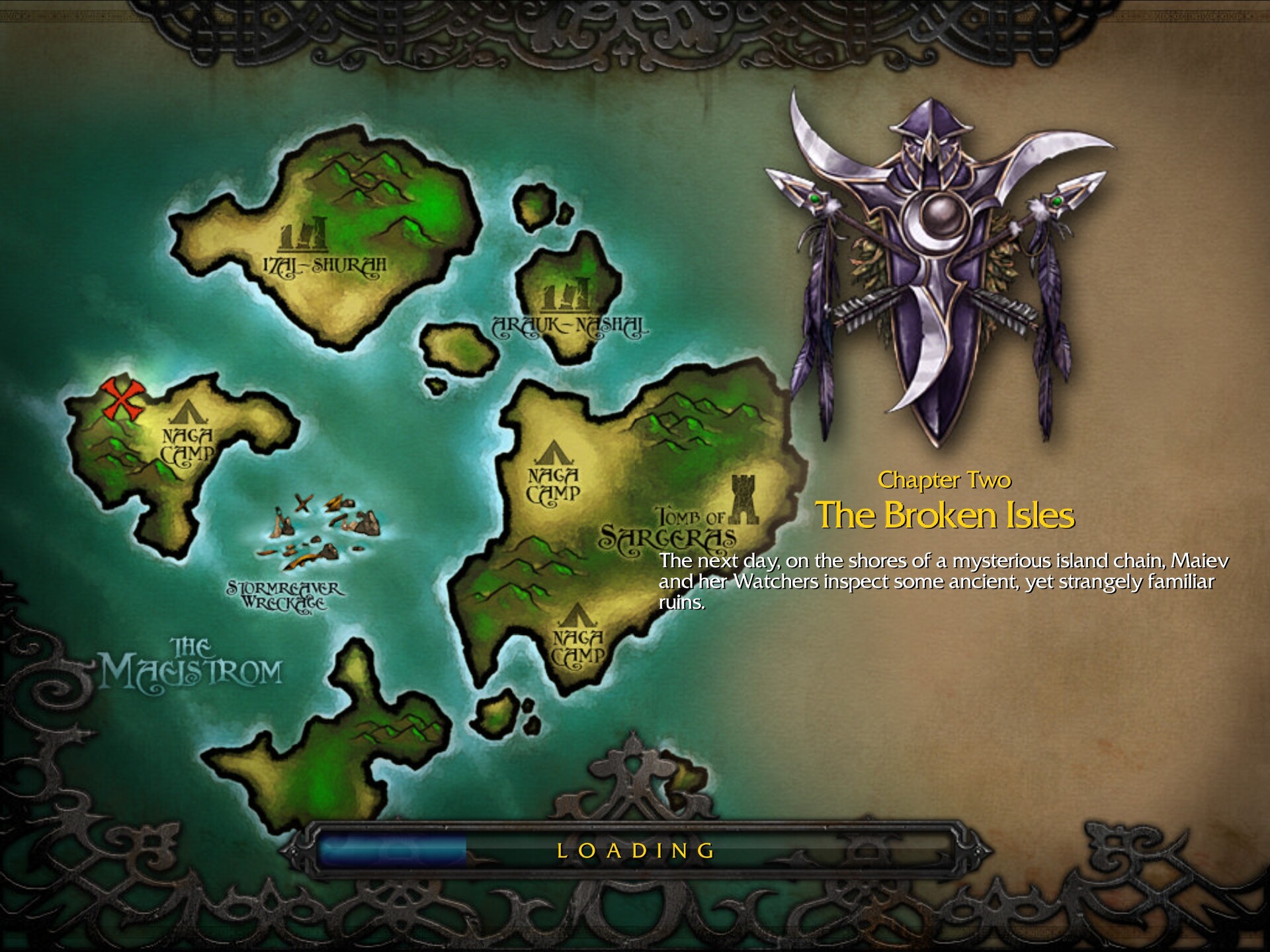
Pursuing Illidan across the sea, the Watchers land on an island that doesn’t appear on any of their maps. Maiev deduces that these islands must have formed only recently, even though there’s no power left in the world capable of doing that. She concludes this because she recognizes the ruins.
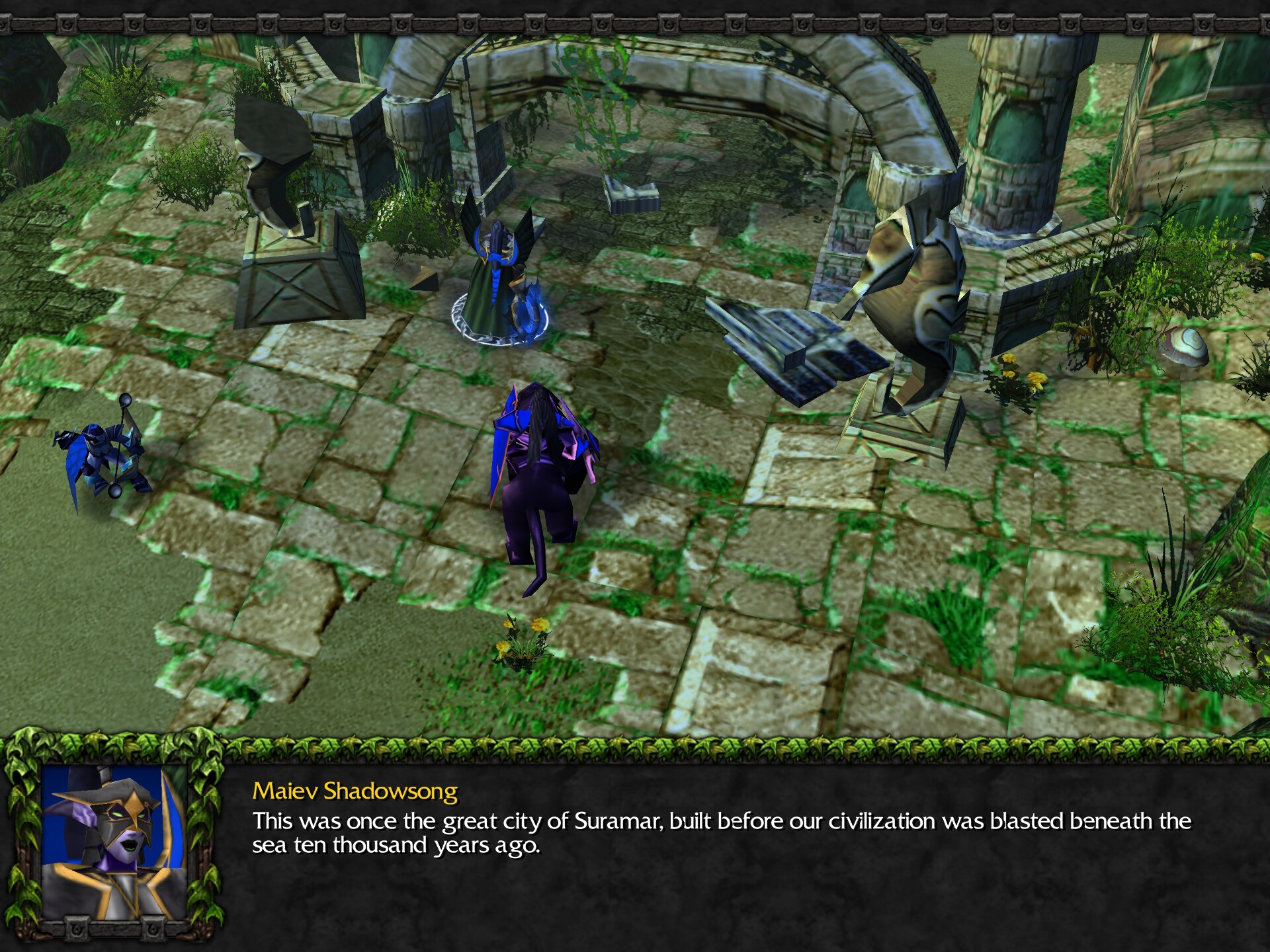
Regardless, it is a mystery they’ll have to solve later. For now, they’ll establish a base. Our stated objective here is the same as before: “Find Illidan”.
At the base, we have much of the night elf tech tree unlocked right away. This is the expansion; it assumes you’ve played the base game and know what you’re doing. The kid gloves are off.
On the very same island, Maiev encounters… an orc?
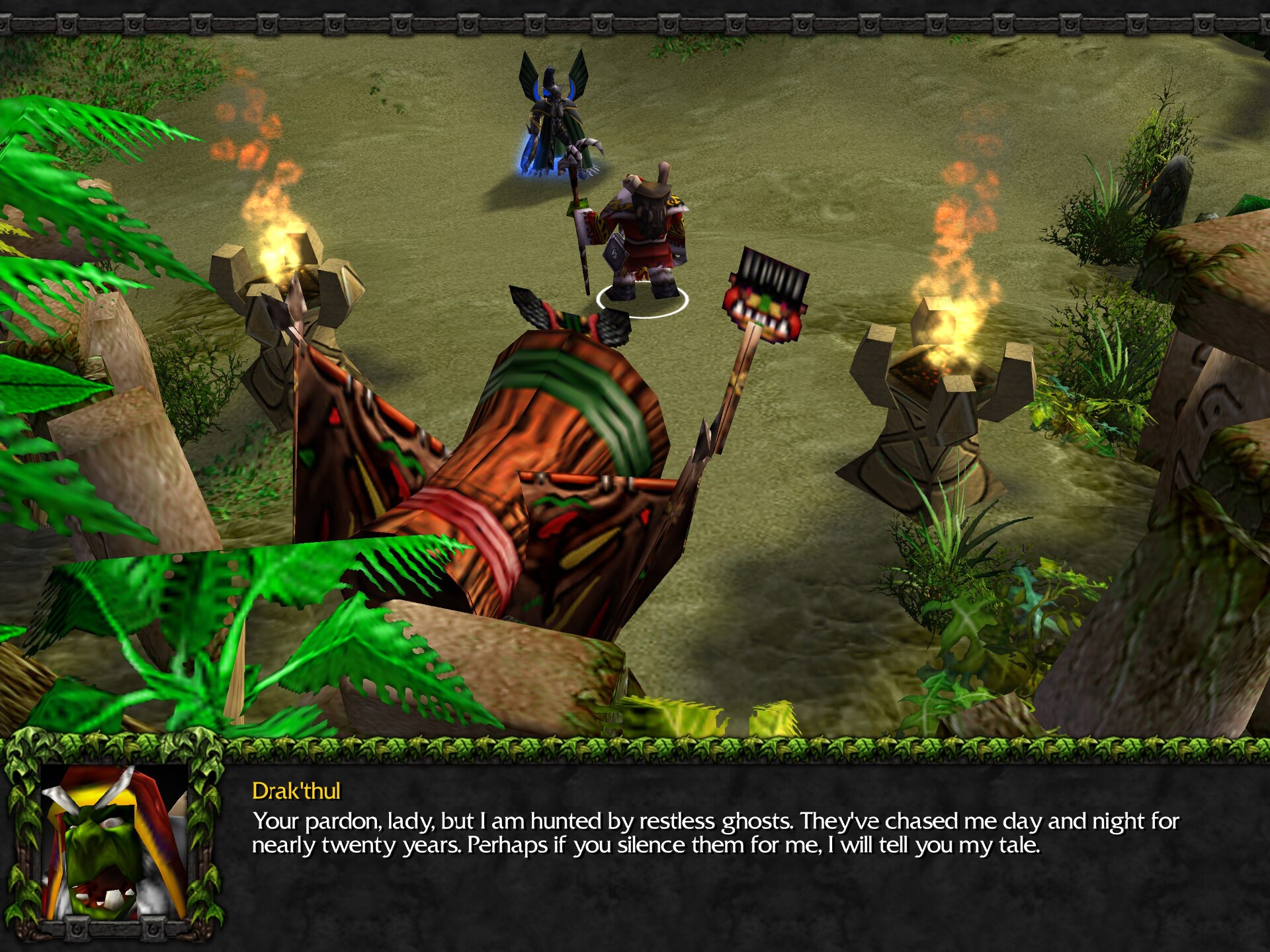
Next to him is a goblin shipyard, introducing us to the main gimmick of this mission, which is sea exploration. Reign of Chaos had no playable ships at all; here they exist, but only as hirable neutral units, with very limited campaign presence, ensuring they don’t overstay their welcome like back in Warcraft 2.
For some reason, the goblin shipyard offers night elf ships. Pondering this riddle for the ages, I level the small naga base to the west. Yes, the naga actually have their own tech tree, with worker units and everything. They were considered as a playable faction for TFT, but were eventually left as an incomplete, campaign-only faction.
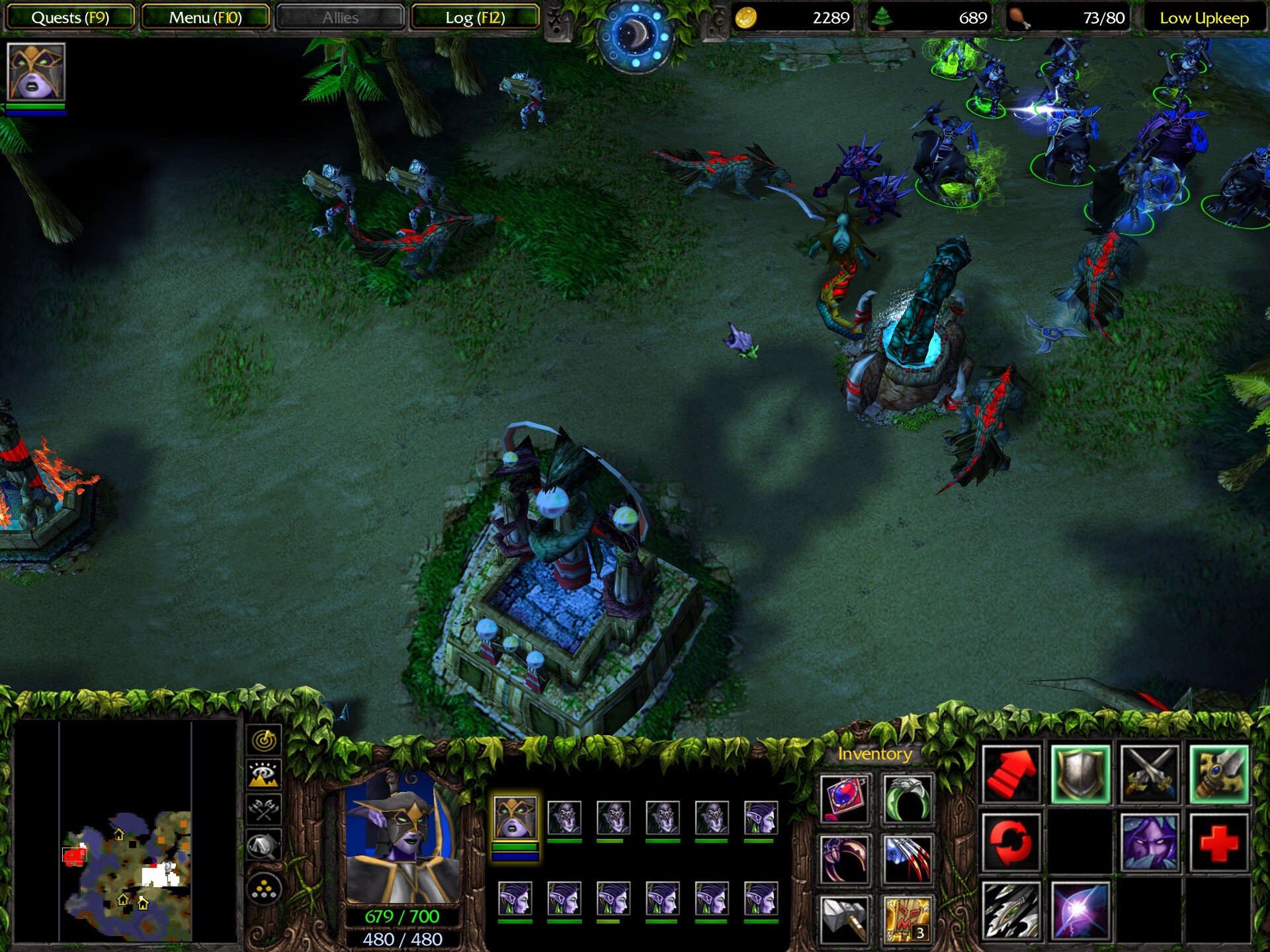
Actually the naga were first designed for World of Warcraft, and as a playable race at that, before TFT even began development.3 However, these plans never materialized because they were an animation nightmare; in particular, the animators couldn’t figure out how they would wear armor and ride mounts.
On that same island, Maiev says what I consider the single most elven line in the entire game. It’s great.
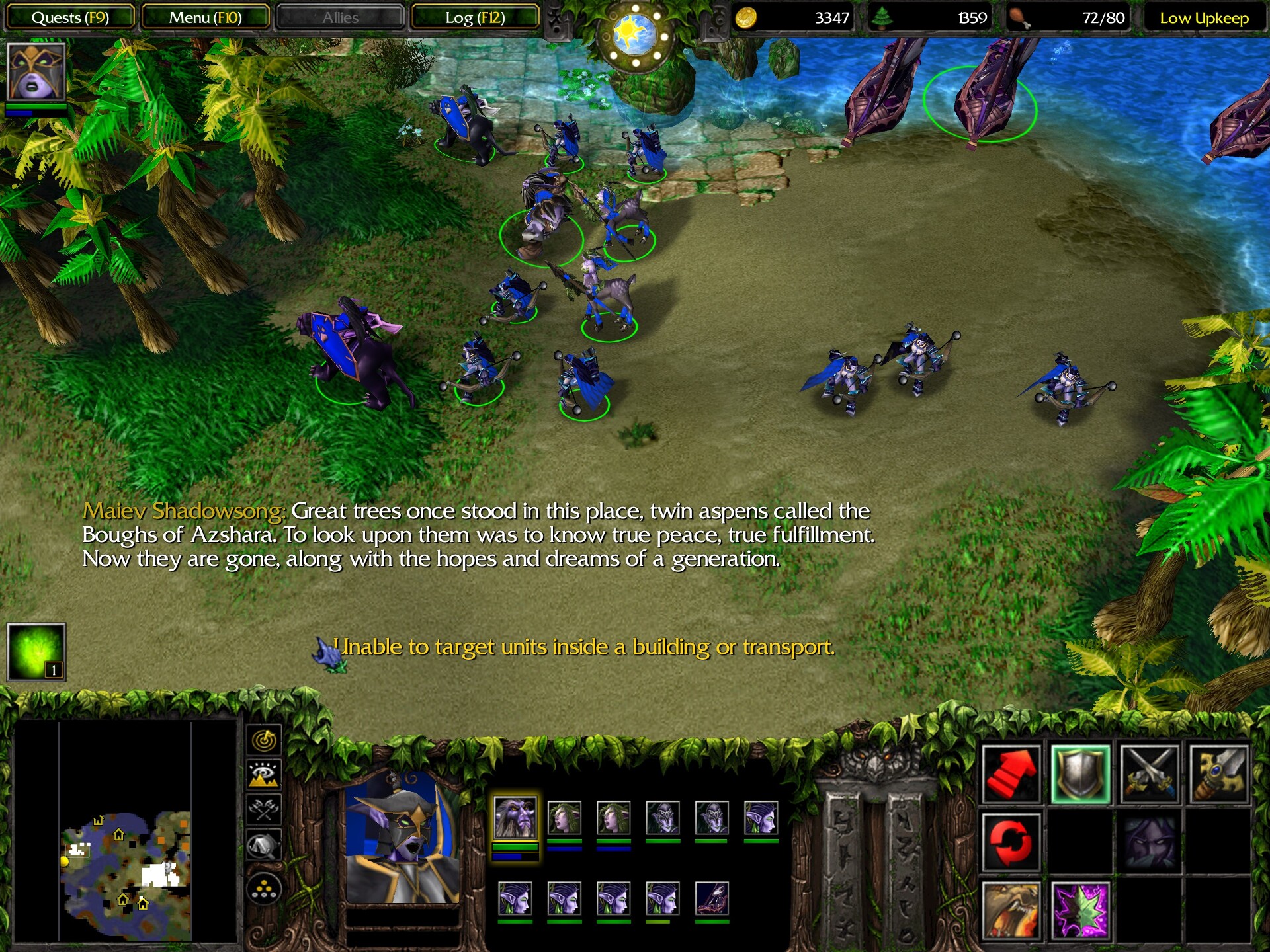
Maiev finally finds the ghosts Drak’thul spoke about: skeletal orcs locked into forever reliving their last battle. Destroying the three buildings that spawn them puts them to rest, and once we return to Drak’thul, he tells Maiev his story.
He was once a warlock of the Stormreaver clan. Nearly twenty years ago, Gul’dan raised these islands from the sea, looking for the remains of the Dark Titan — whom Maiev identifies as Sargeras, the Legion’s creator.
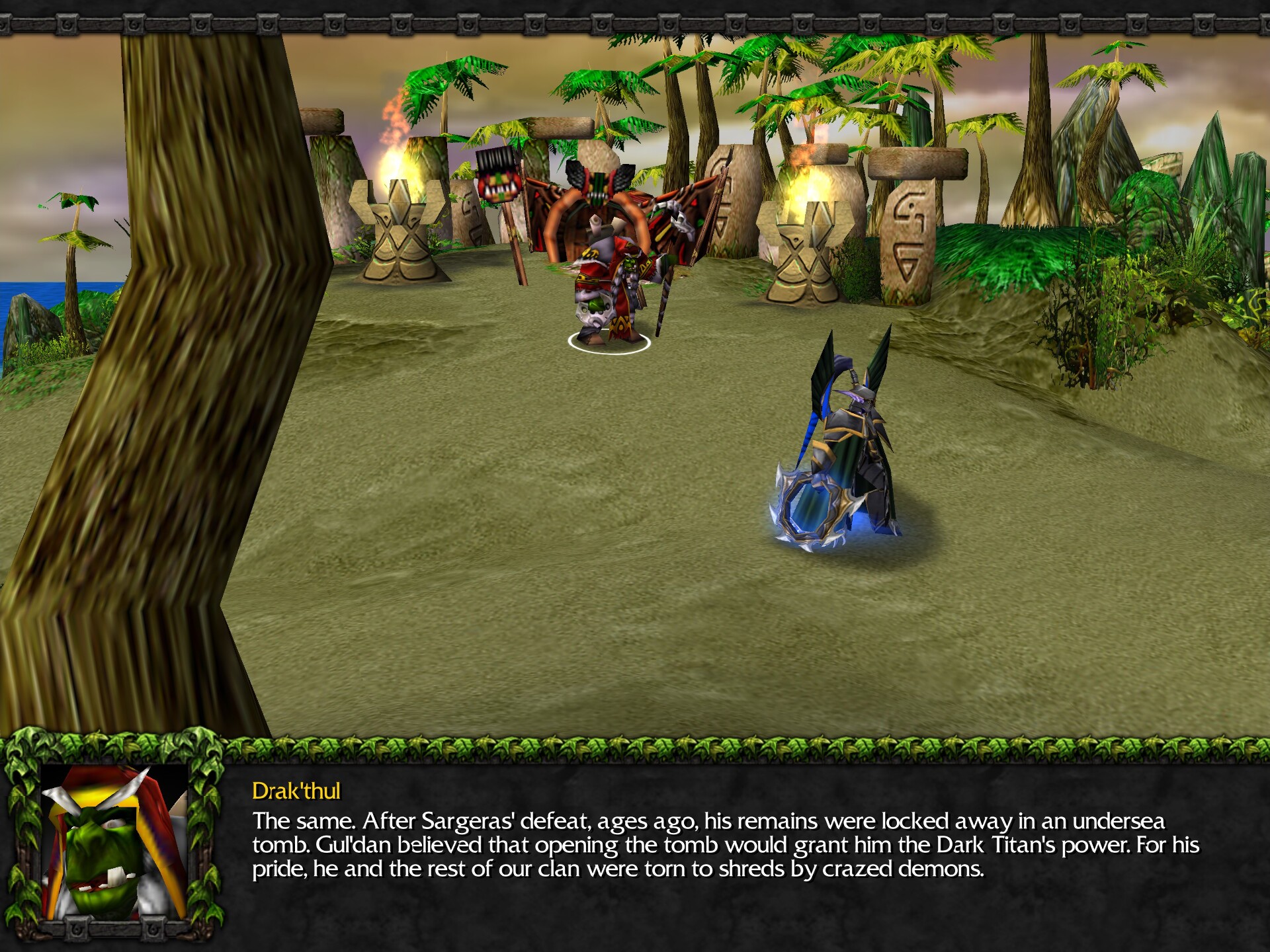
Ever since Gul’dan’s demise, Drak’thul wandered the isles alone, haunted by restless ghosts. Maiev now actually regrets helping him, saying he deserves far worse. Still, a reward is a reward, and we get a Robe of the Magi +6 for our efforts.
Illidan himself is found at the gate of the Tomb of Sargeras, in the northeast, but the way is blocked by a large and powerful naga base.
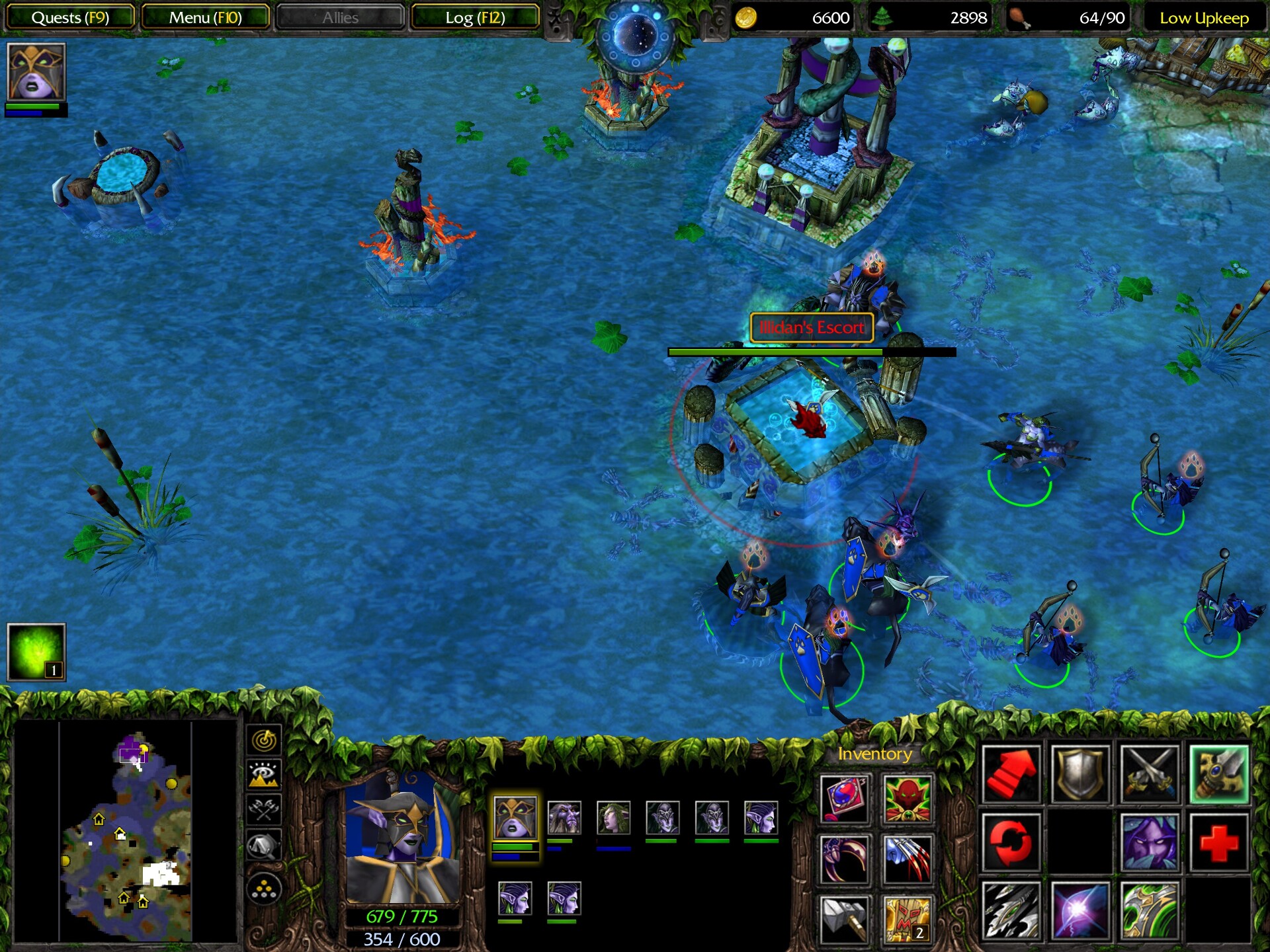
Once we destroy it and get closer to Illidan, he enters the tomb while ordering his entourage to stand guard.
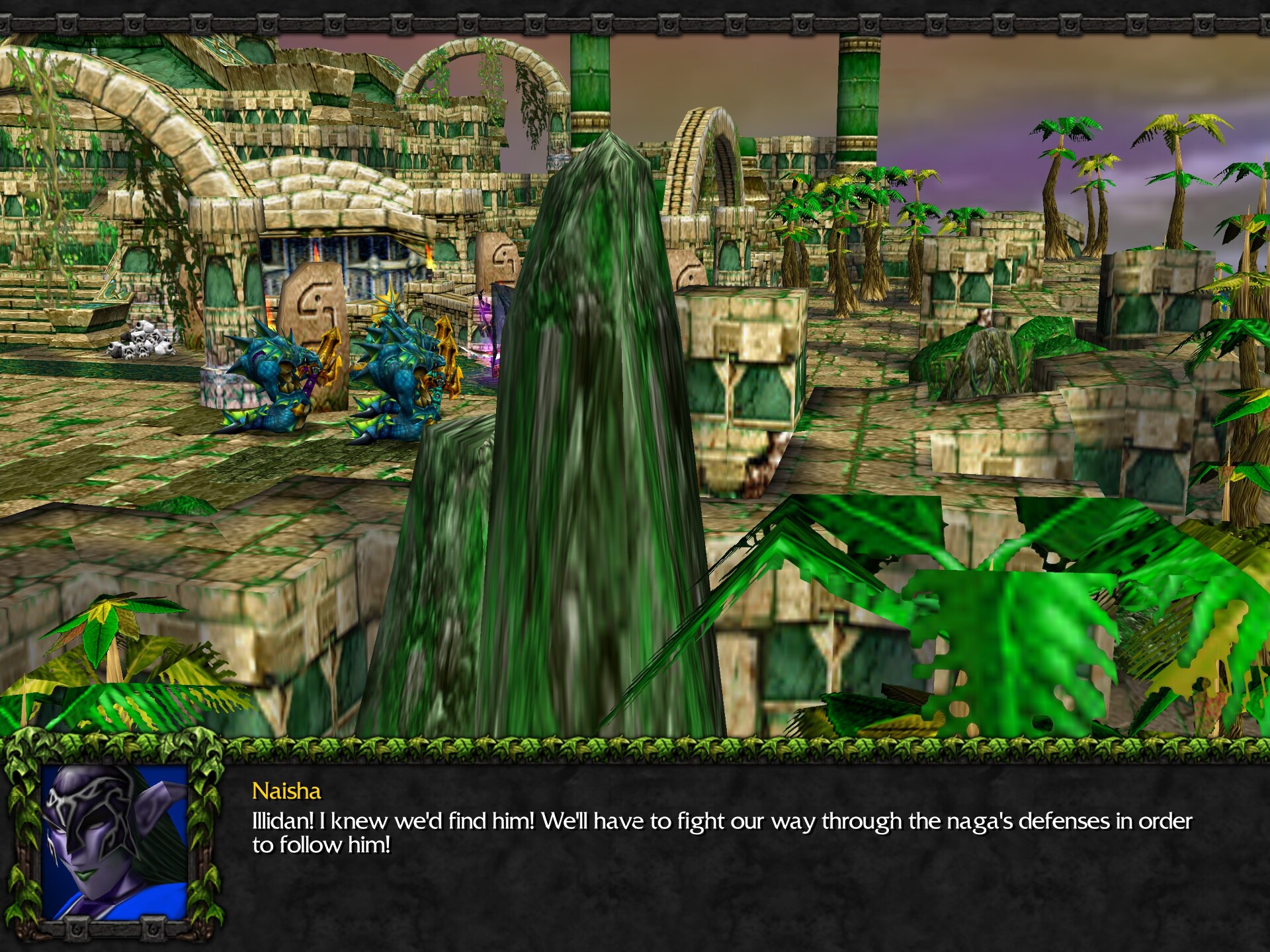
The guards are nowhere near as difficult as the naga base was, though. Now that our own base is no longer under attack, we can sail around the entire map, find the remaining secrets, and then engage the naga guards and complete the mission. I like how on many base-building missions, the game lets the player be in control of when exactly they’re ready to proceed with the campaign, letting them discover and collect everything at their leisure once the main threat is gone.
We dive after Illidan into…
The Tomb of Sargeras
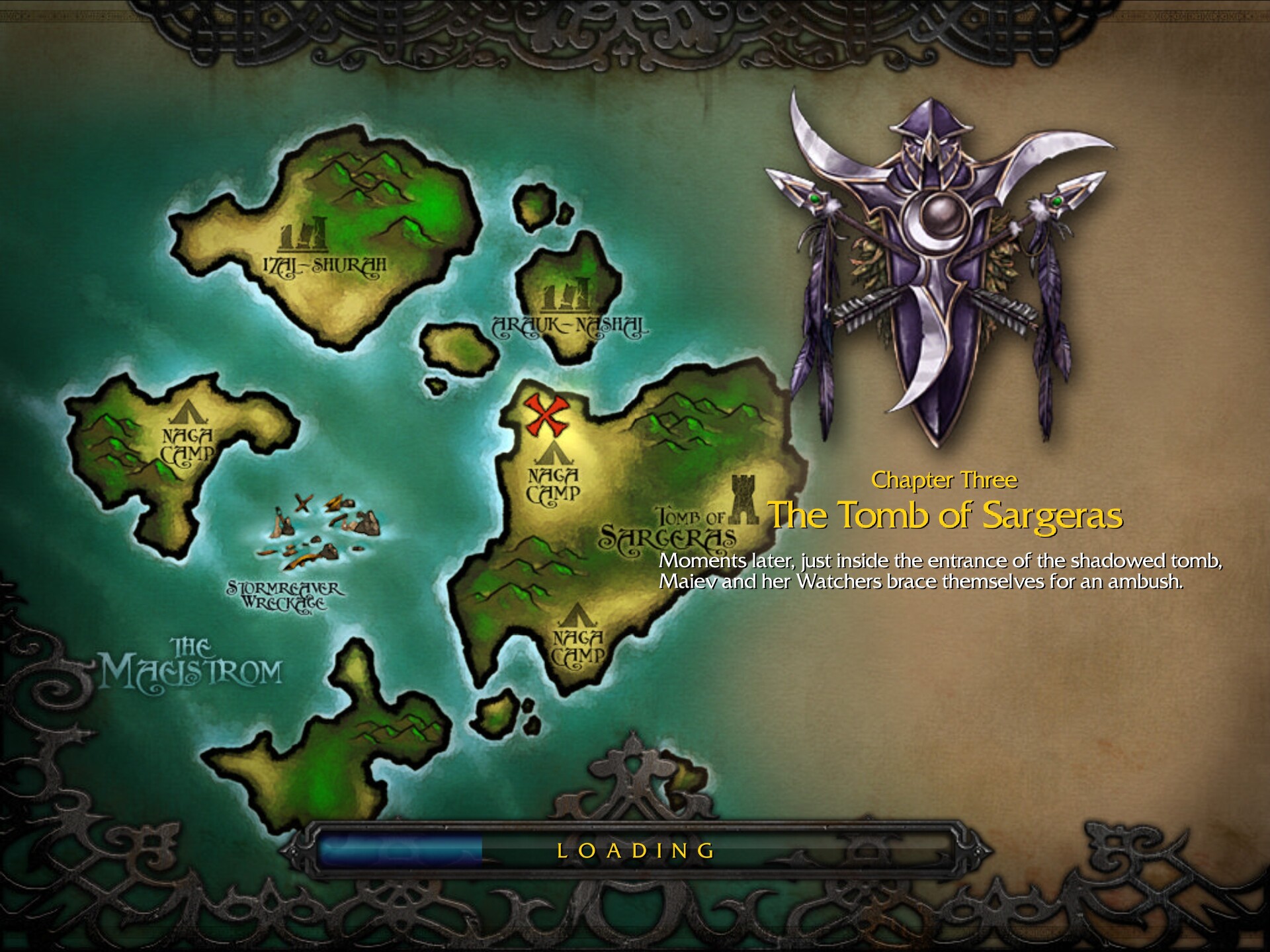
The Watchers have entered the Tomb of Sargeras. Now, suddenly and without any foreshadowing, we learn that Maiev, who had never seen an orc in her life until a few months ago, can somehow read orcish runes.
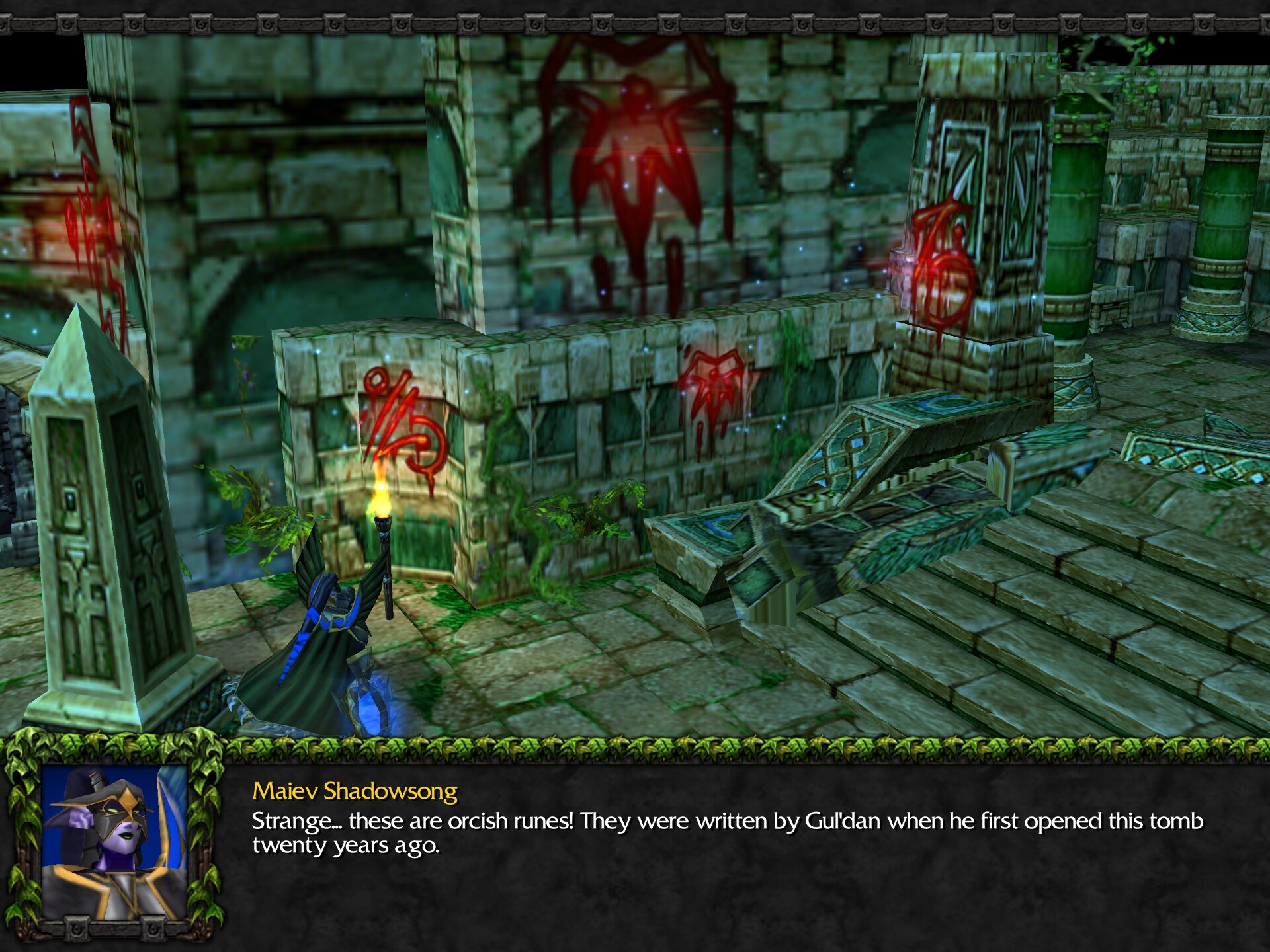
Twenty years ago, Gul’dan entered the tomb with his minions, whom he can barely keep in line by shooting one who is overcome by fear and tries to run away. And yes, it’s really awkward that he wrote down all this and Maiev can read it. If anything, making these flashbacks magically induced visions would have helped.
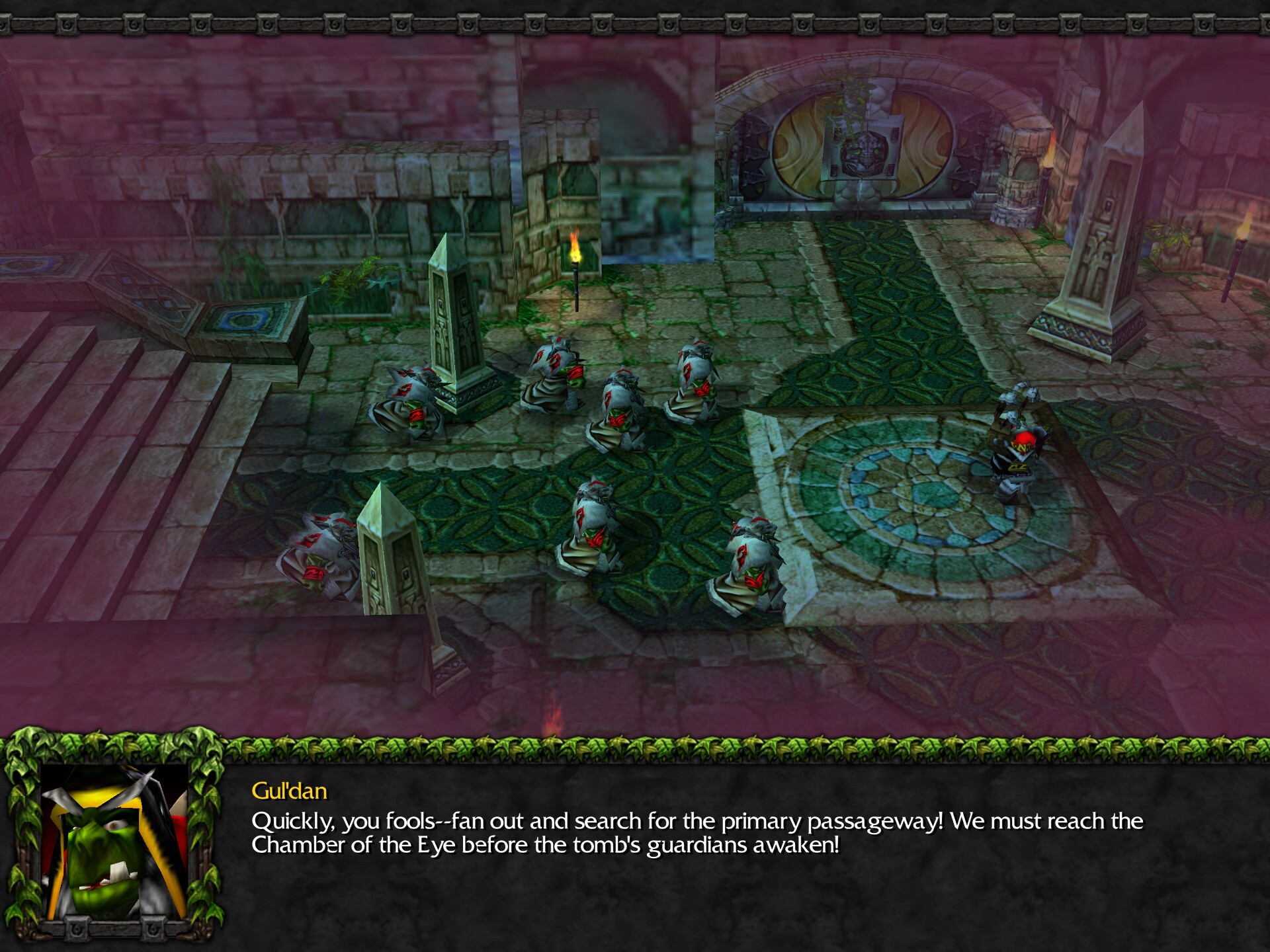
Thus begins a long dungeon crawl — my favorite one in the game. There are many, many secrets here designed around Maiev’s Blink, including a lengthy sidequest based around assembling a really powerful item.
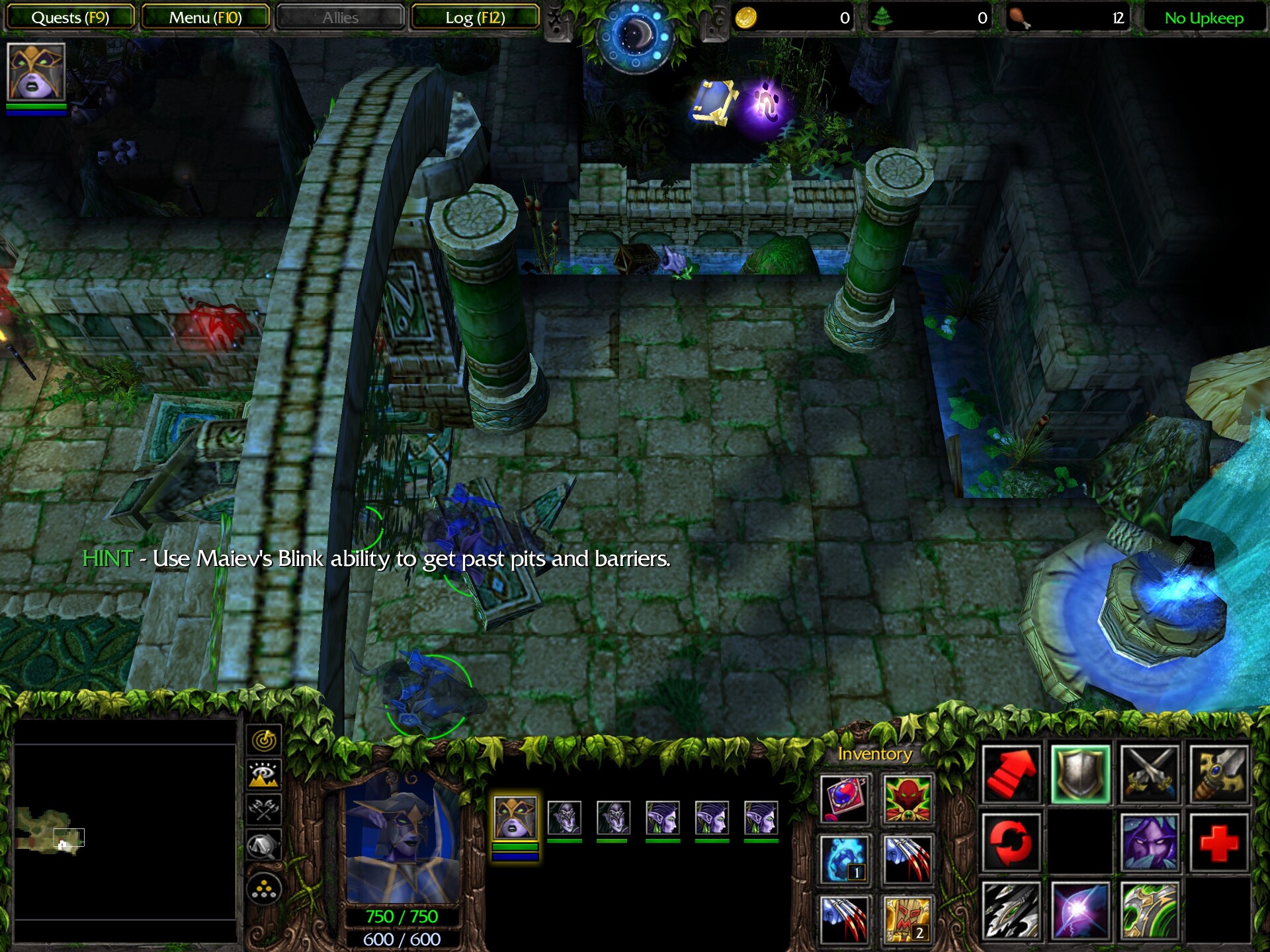
We fight a great variety of enemies: demons, orcs, skeletal orcs, naga, giant turtles, hydras, and more. This place really feels like it was built by night elves at the height of their power before being buried under the sea.
The powerful item in question is Gul’dan’s Shadow Orb. It consists of ten pieces to be collected across blinkable areas, and with each collected fragment, it grows in power.
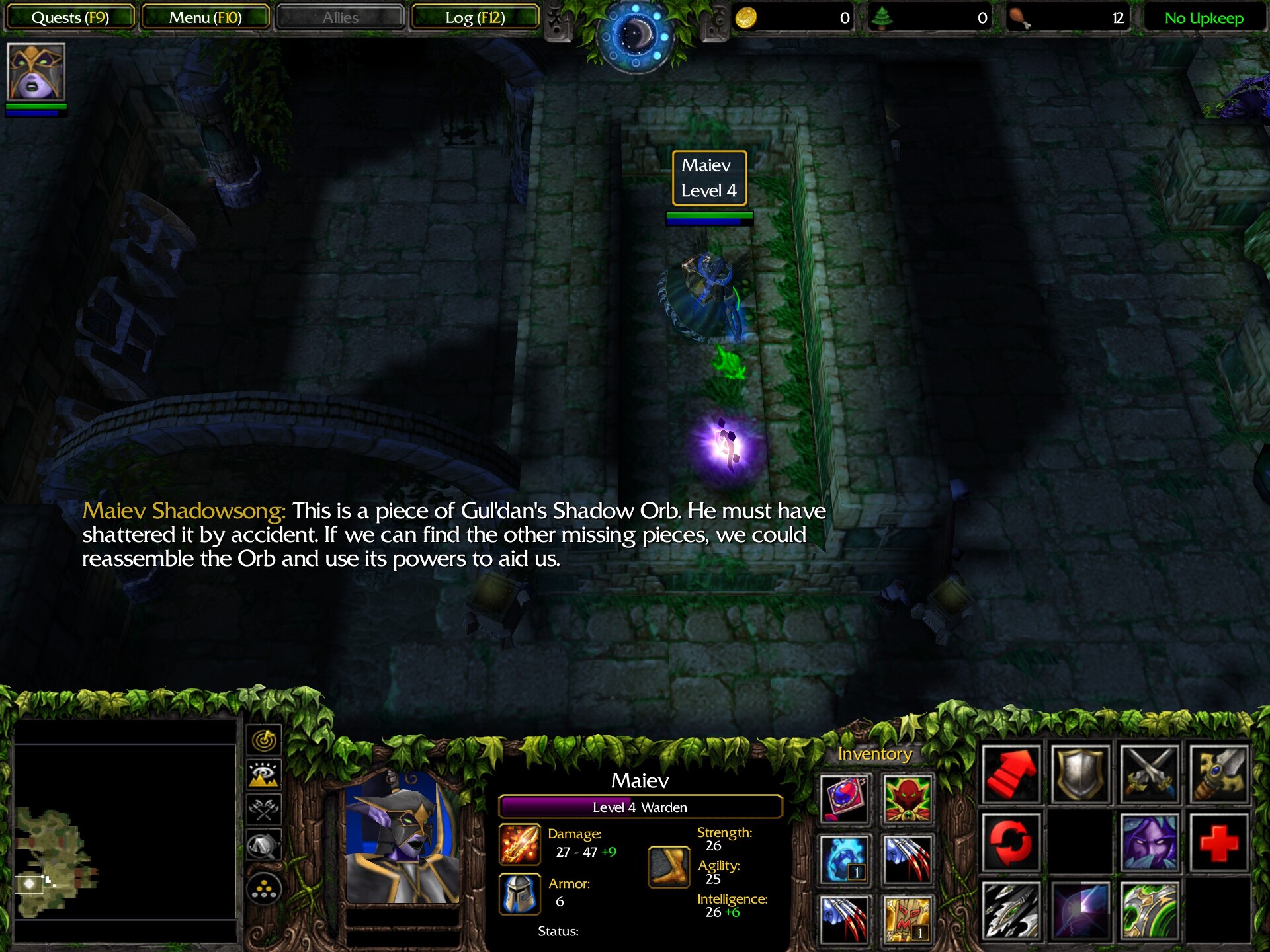
Along the way, Maiev finds more of Gul’dan’s glyphs. Having lost all his minions — “blasted, feeble-minded weaklings” — he presses on alone.
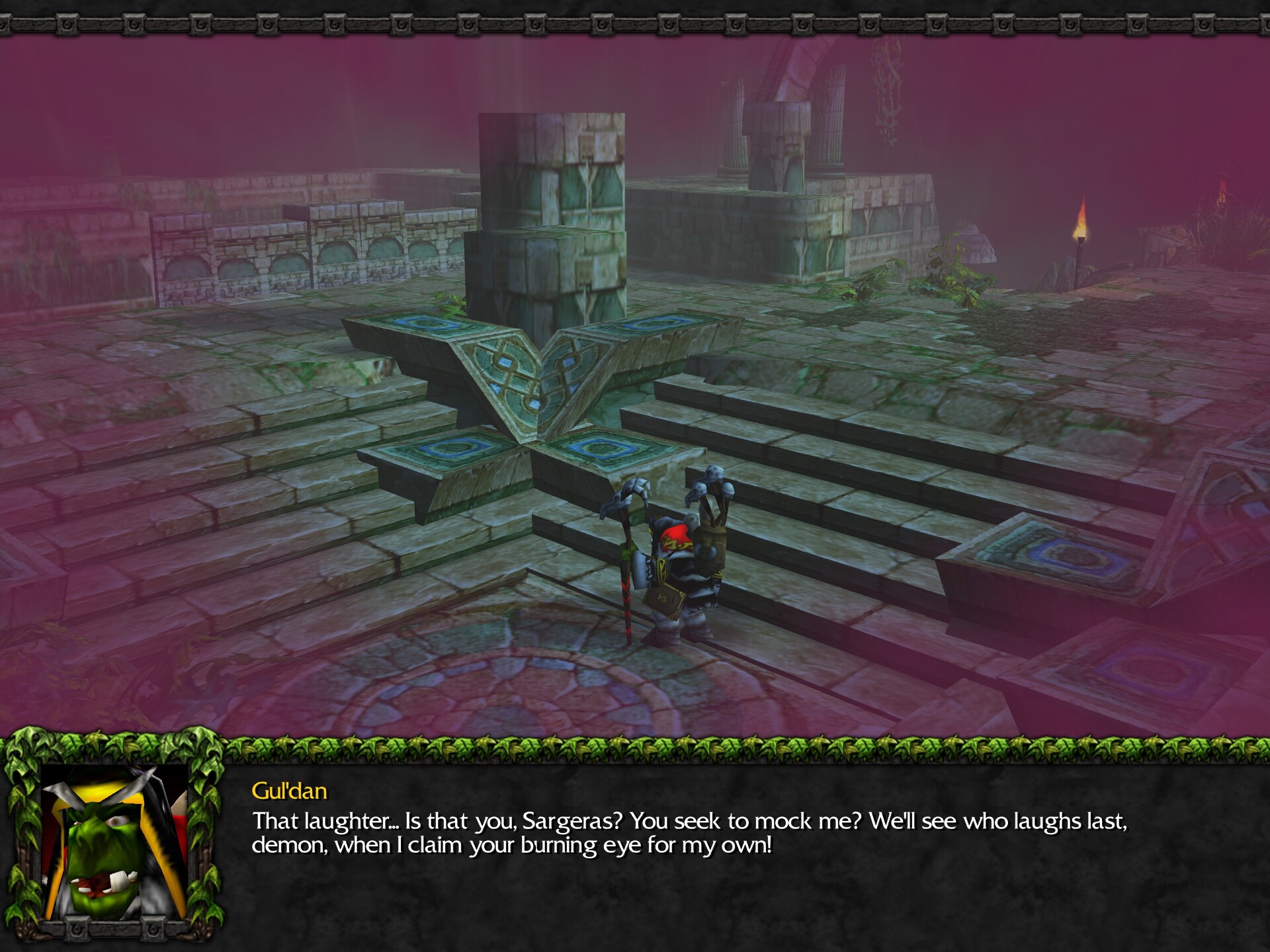
“Again, he referenced this mysterious ‘eye’,” remarks Naisha. Maiev concludes it must be an artifact, powerful enough to lure Gul’dan in.
We reach some water-filled caverns, and… this was where I unintentionally broke the intended sequence of cutscenes by blinking too zealously in search of orb fragments. This scripted scene is supposed to come first, but I saw it second — after realizing I cleared, by blinking in with Maiev alone, a location that was supposed to be reached with the entire squad.
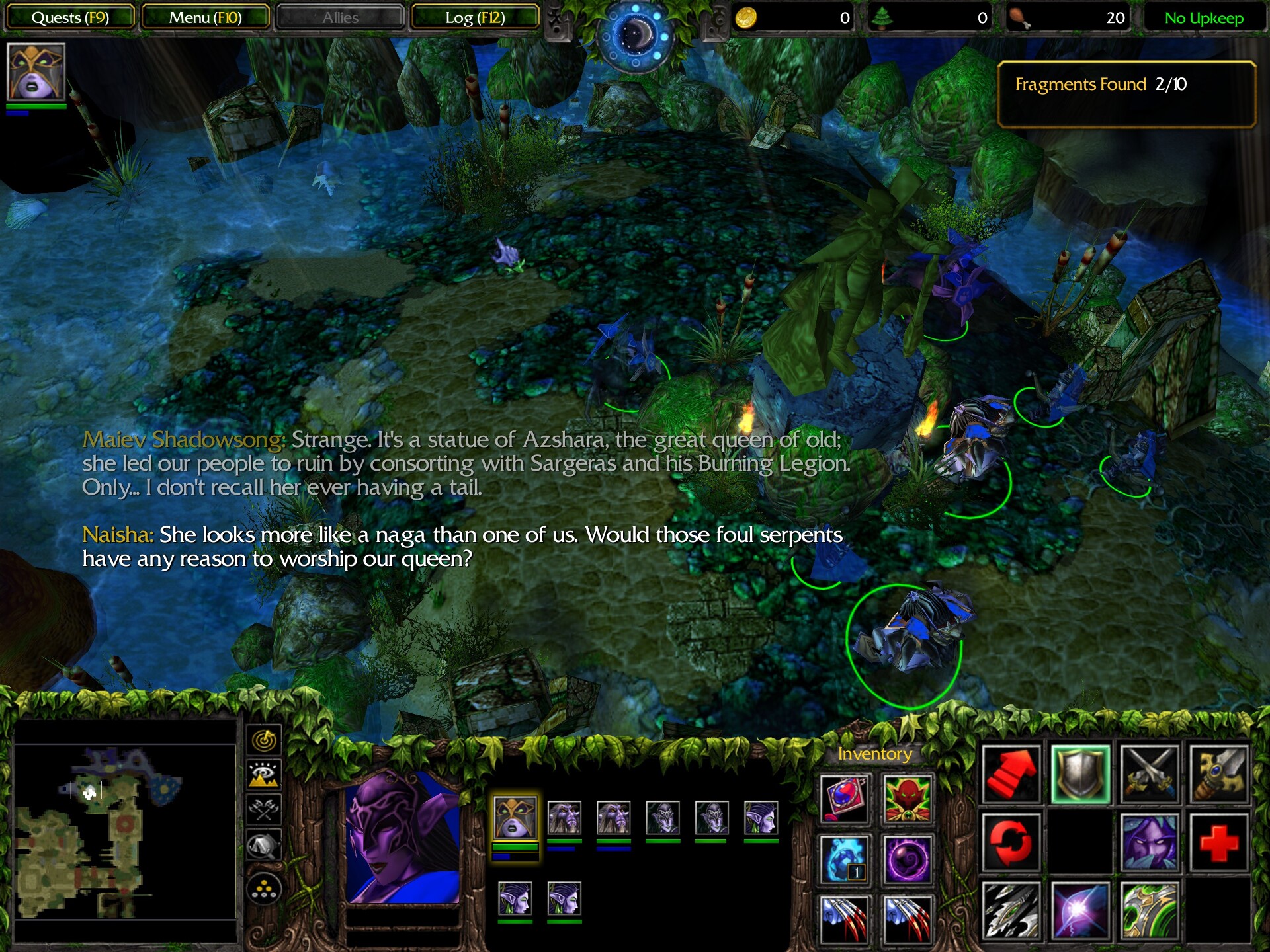
The Watchers reach a statue of Queen Azshara, who looks more like a naga than a night elf. Hmm, that sure is curious.
This is soon explained by the next scene, which I unintentionally saw first in this playthrough, but which is supposed to come second when exploring “normally”. Maiev encounters a naga archer who explains that her people were once… night elves!
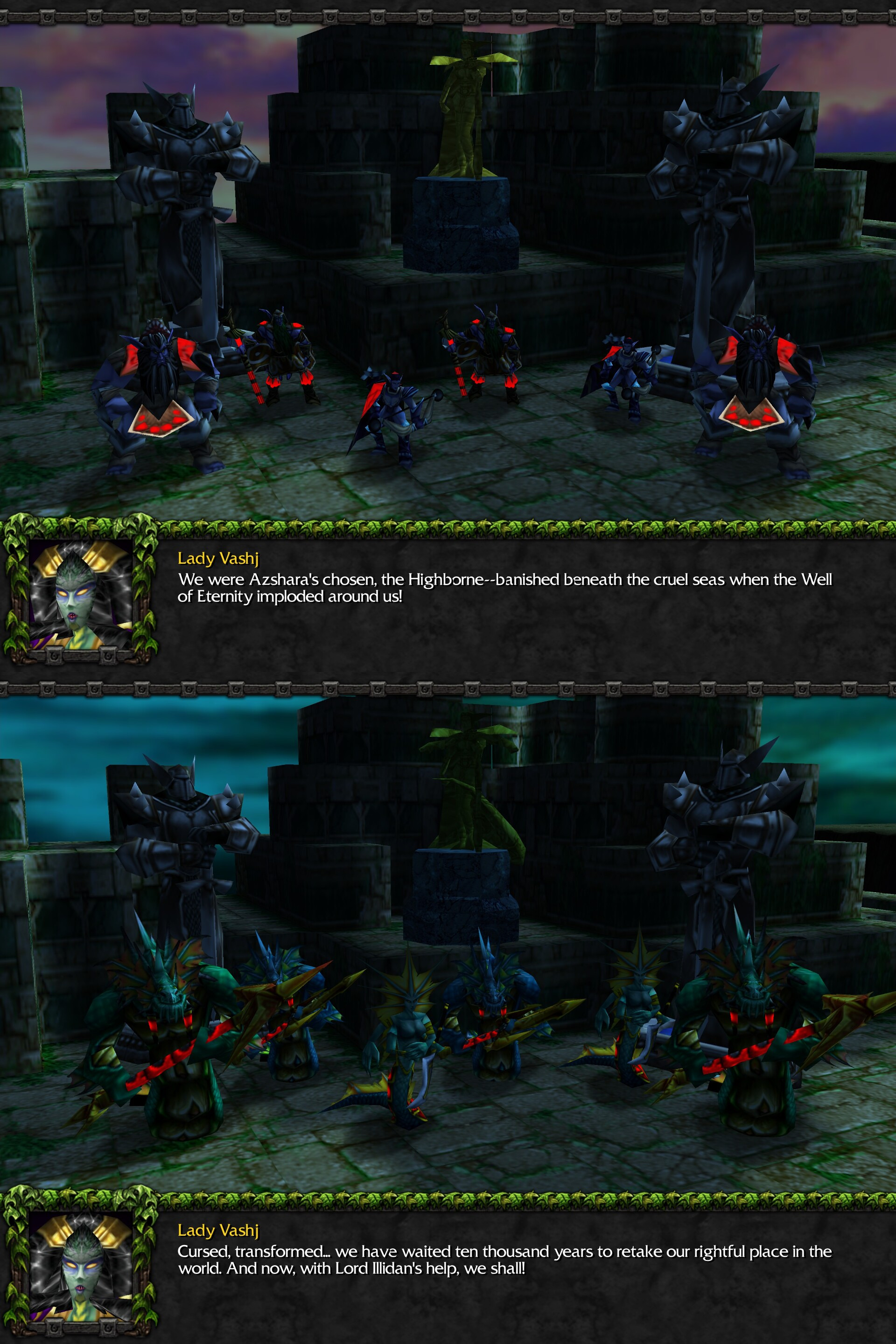
Between satyr, naga, and Illidan, we now have three different types of corrupted former night elves.
Exploring the flooded cavern, we come across an inconspicuous tree.
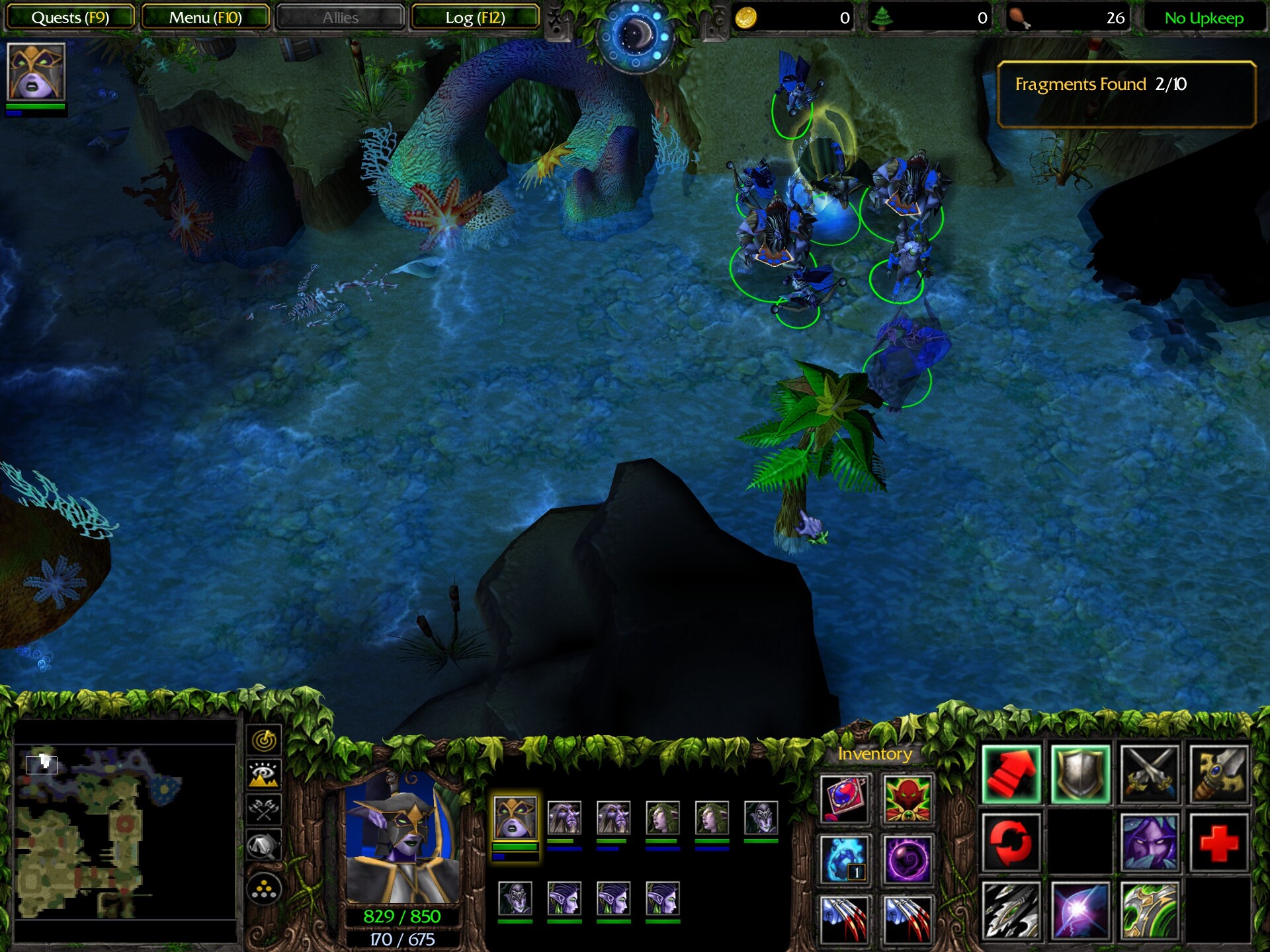
Hmm. We have huntresses in the squad. I wonder what happens if I put a sentinel on it–
…Oh.
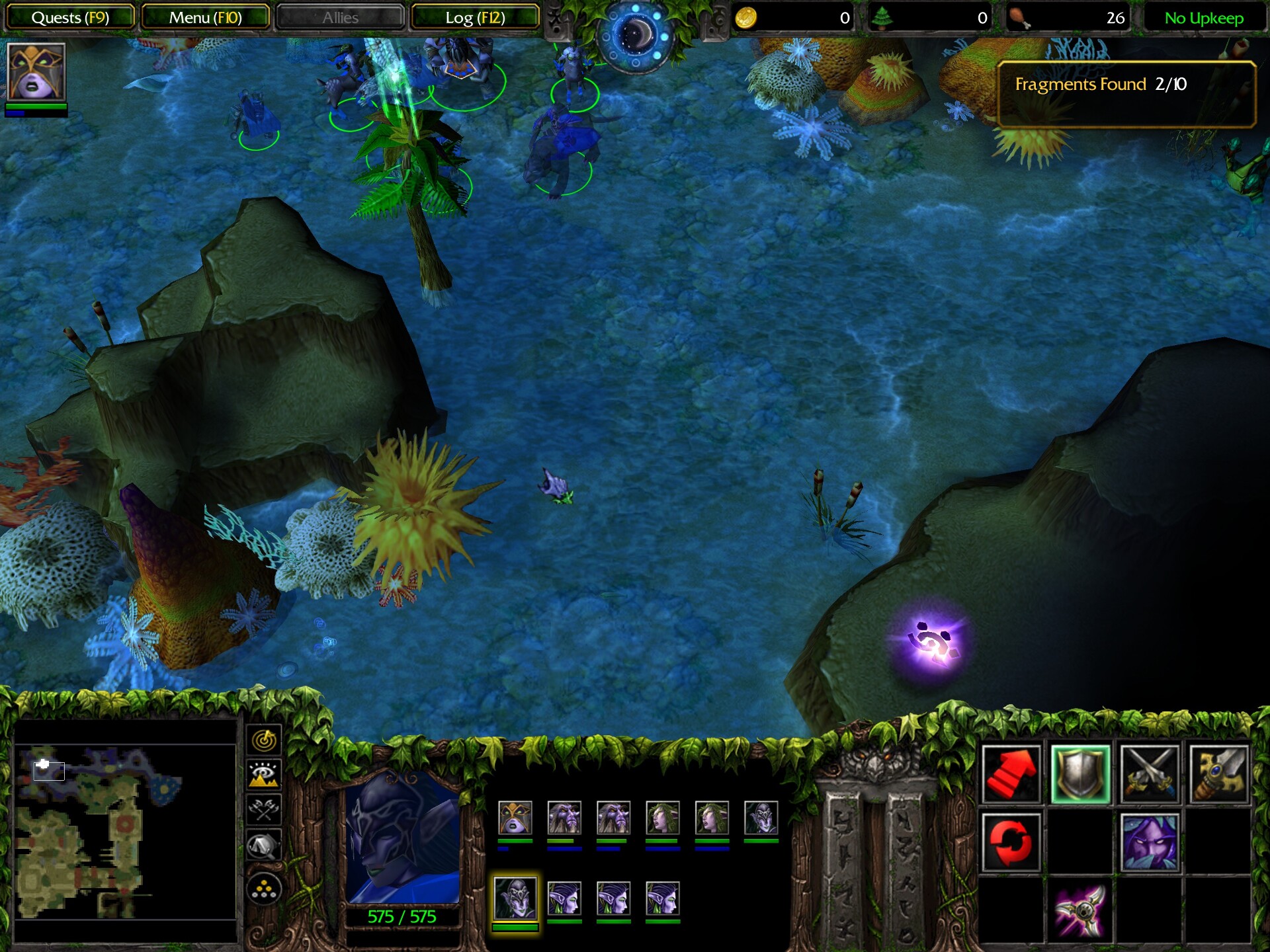
The sneaky map designers put three orb fragments into places that can only be blinked to after placing sentinels on two trees. This is why it’s imperative not to lose Naisha until at least this point: she can cast unlimited sentinels, and while the single regular huntress can place one of them, Naisha is required for at least the second one.
After a heavy fight with naga, we reach another chamber with orcish runes. Gul’dan’s story, it turns out, ended very anticlimactically. He kept writing even as he barely mustered the strength to come here, ambushed by the guardians and dying.
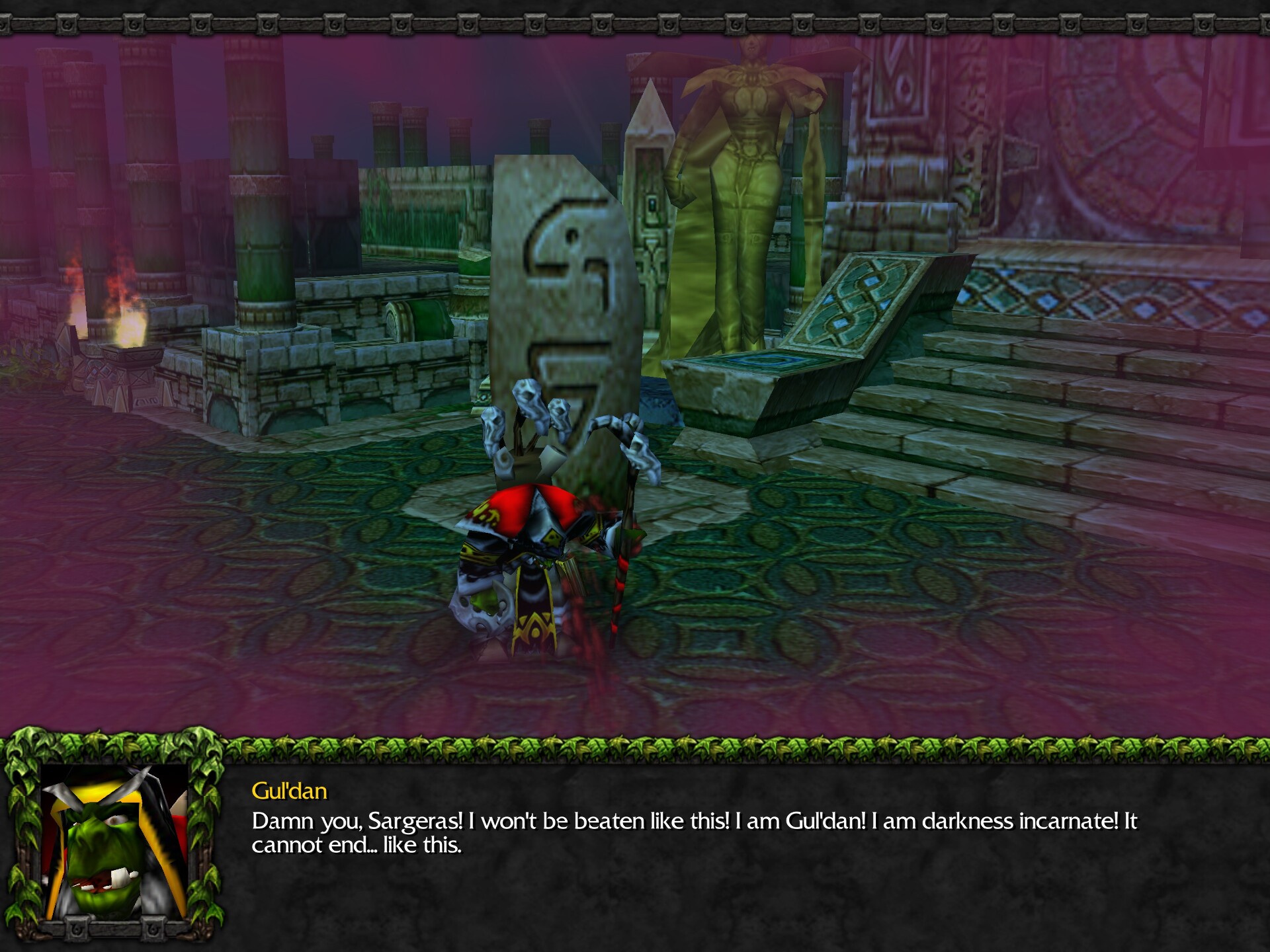
Poor Gul’dan. This was the first time I saw him on screen, and not only did they give him an unflattering model (actually the same as Drak’thul’s), but they painted him as a pathetic loser who lost all his followers, accomplished nothing of importance here, and eventually died to bleeding wounds inflicted by some random demons.
We reach a massive runed gate. The game is, once gain, kind enough to warn us that this is a point of no return.
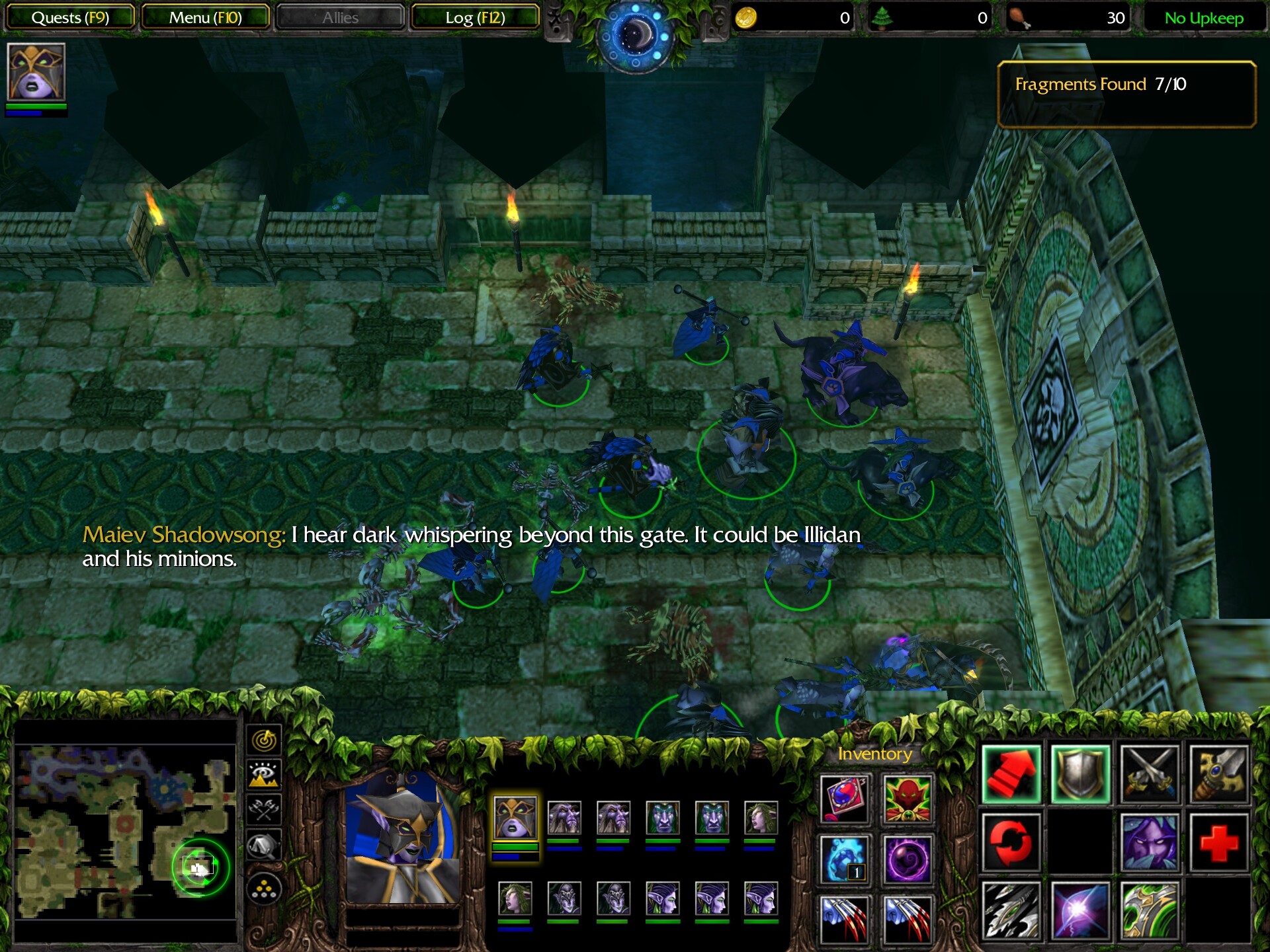
Before proceeding, I collect all remaining orb fragments. Maiev and the Watchers burst into the next chamber… but they’re too late.
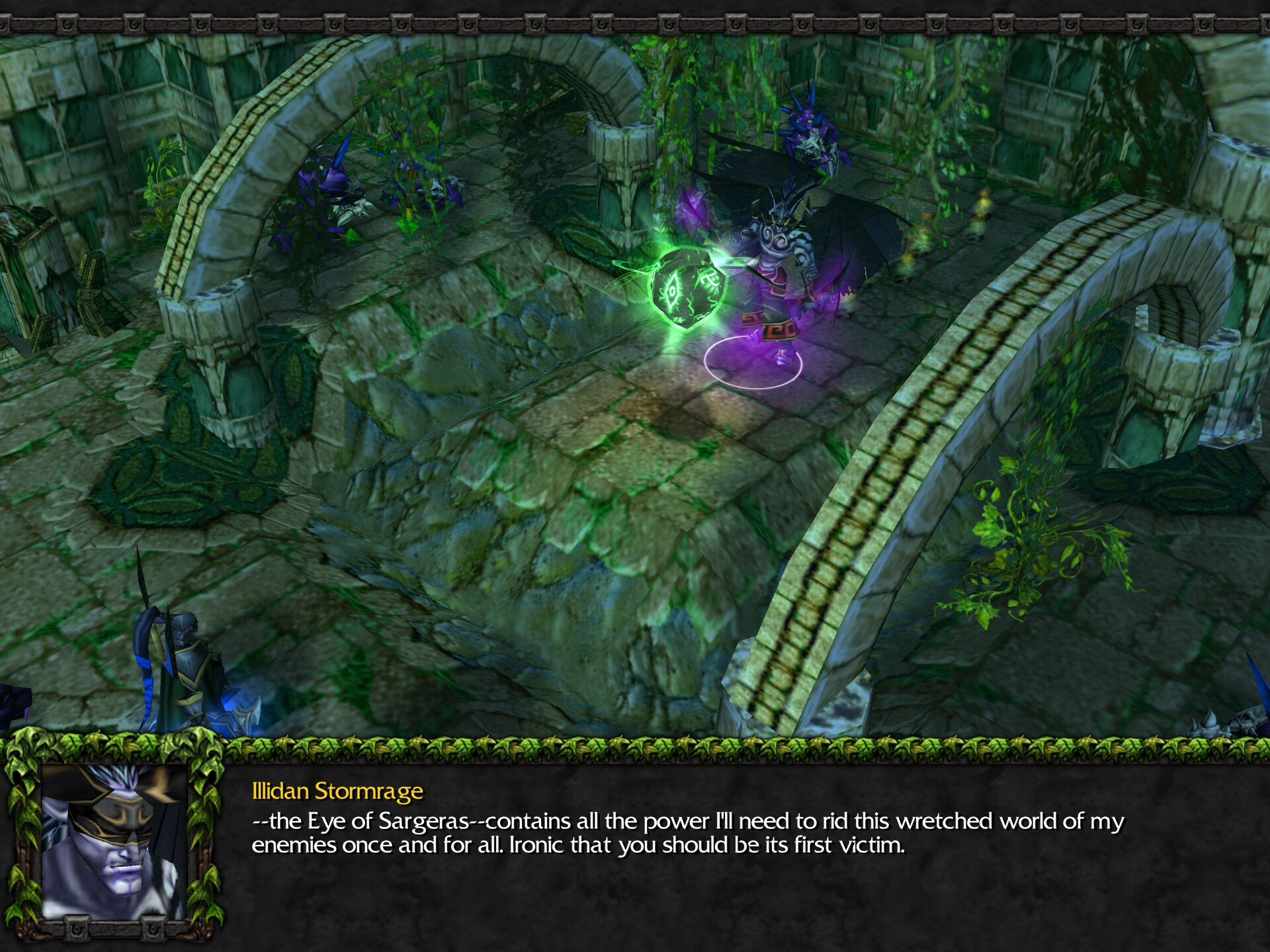
It turns out that Maiev actually had no plan. Or a bit more charitably, her plan was…
- Find Illidan.
- ??????
- Justice!
Illidan made it here to claim this artifact, the Eye of Sargeras, of which he learned when he got Gul’dan’s memories through consuming his skull. This just raises further questions. For example: why didn’t Ner’zhul’s henchmen back in Beyond the Dark Portal claim it alongside the Scepter of Sargeras? Even if it wasn’t strictly needed for Ner’zhul’s plan, I imagine neither he nor Teron Gorefiend would pass the opportunity to claim a powerful artifact that happened to be lying in the way.
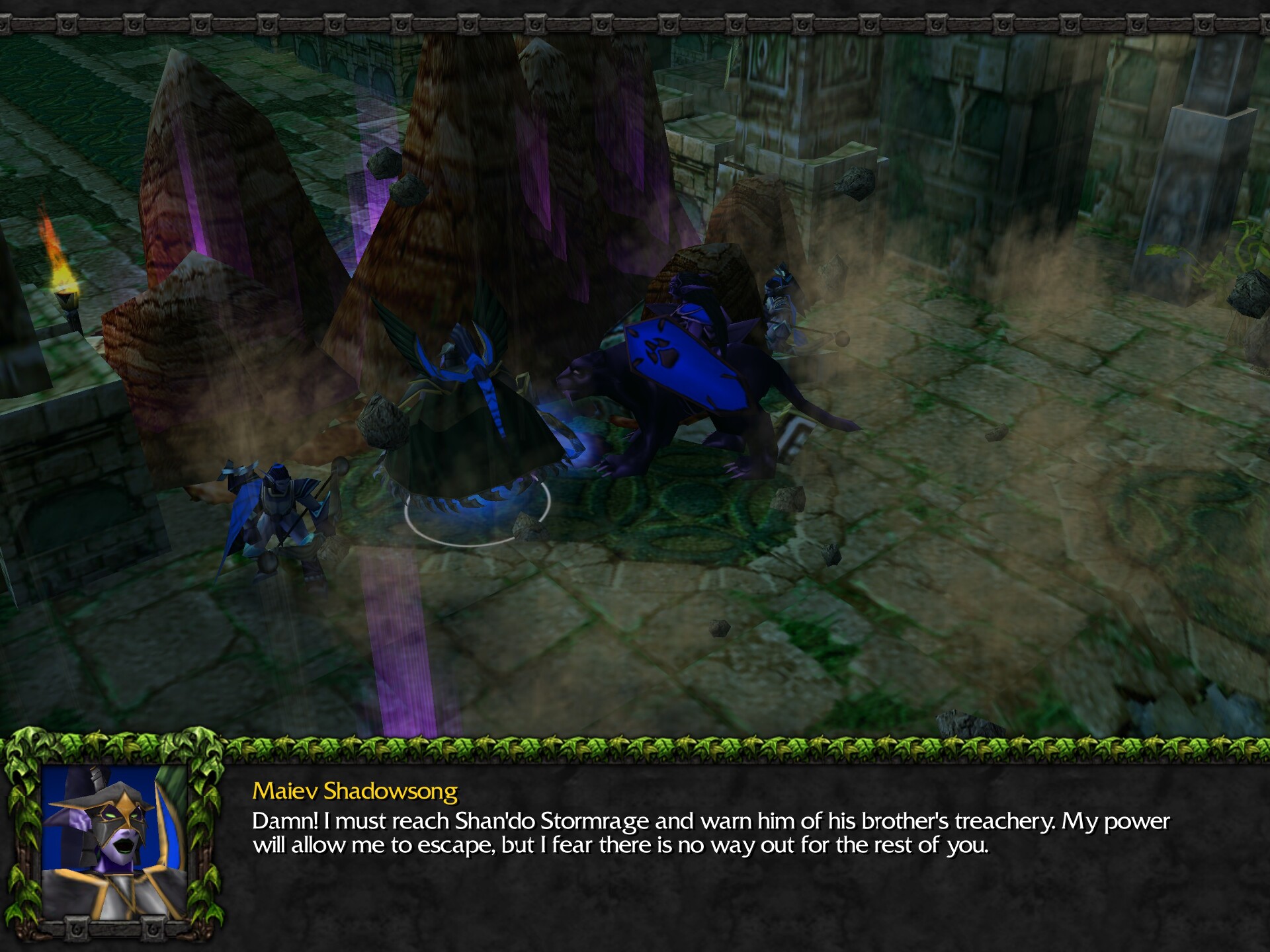
With the Eye, Illidan causes a cave-in, which Maiev alone escapes by blinking away just as the ceiling collapses on Naisha and the others — who Maiev swears will be avenged. And just as you thought this was the end, the mission unexpectedly continues.
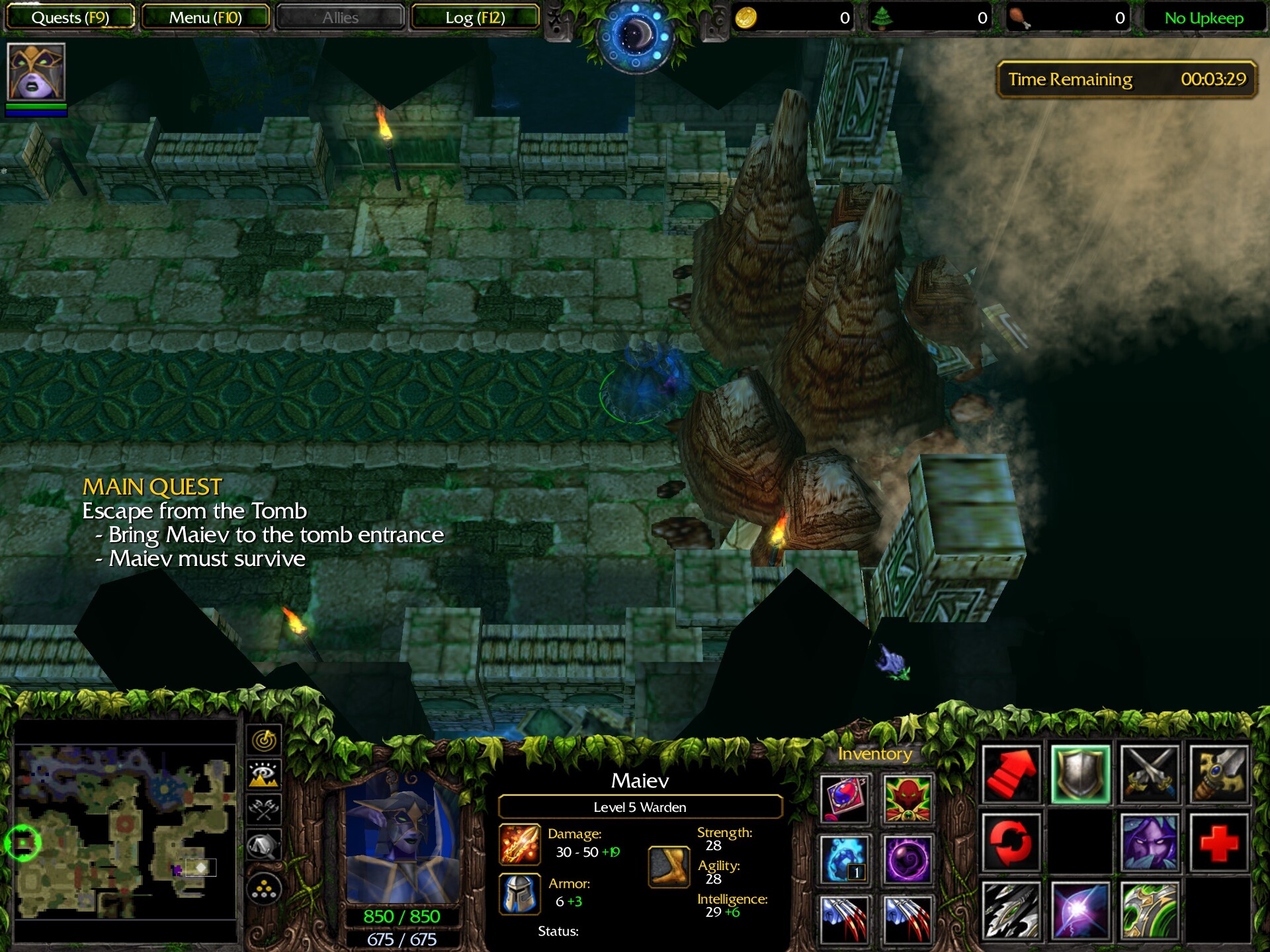
This section is why I leveled Blink to level 3, even though it gimped Maiev’s combat ability. At levels 1 and 2, Blink has a ten-second cooldown, but at level 3 the cooldown is reduced to one second. This let me blink with impunity across the entire dungeon, now refilled with enemies, and I reached the entrance with plenty of time to spare.
Wrath of the Betrayer
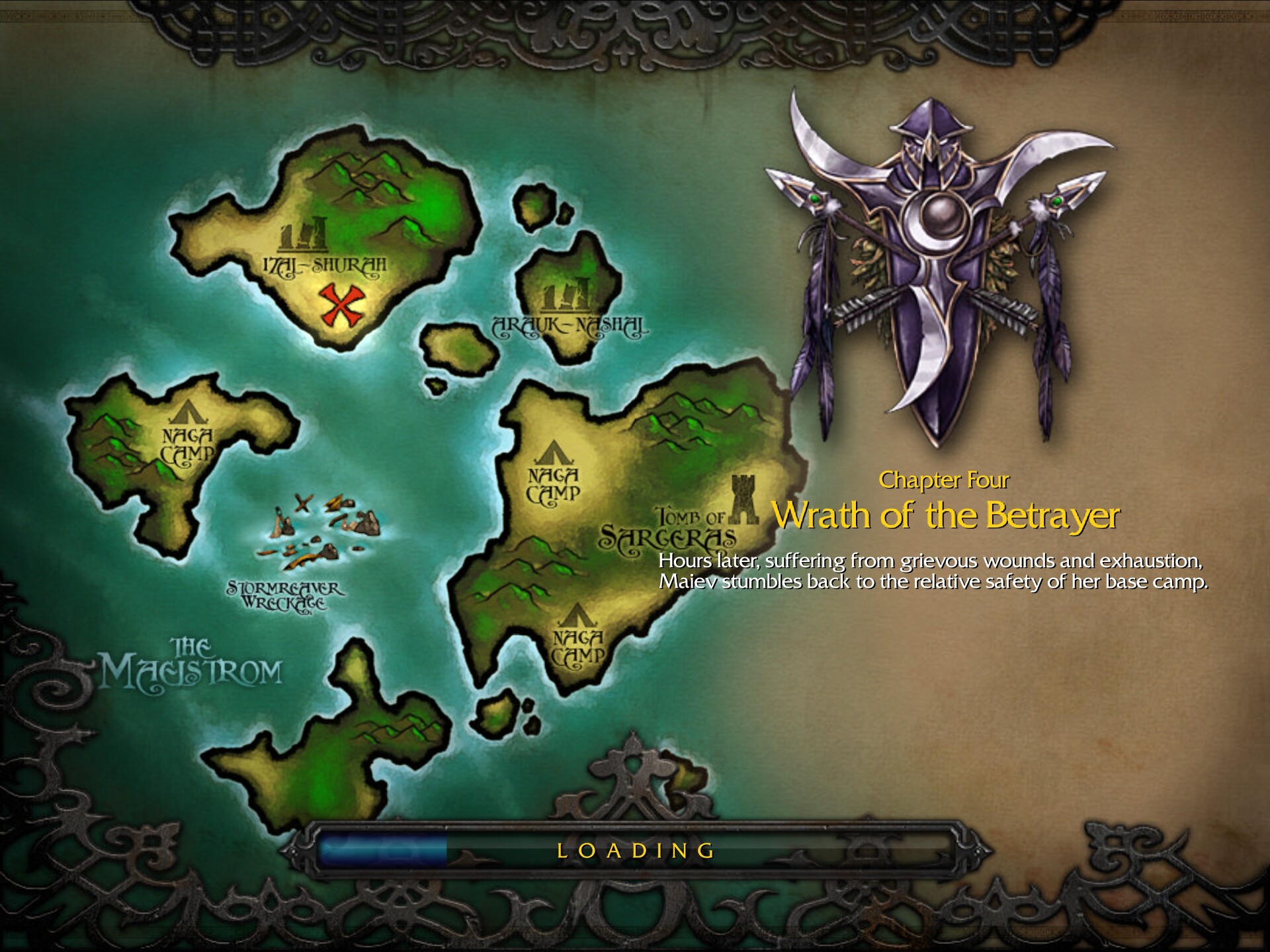
Maiev escapes the Tomb just before it collapses. The Watchers can’t stand against Illidan on their own and need to send for help.
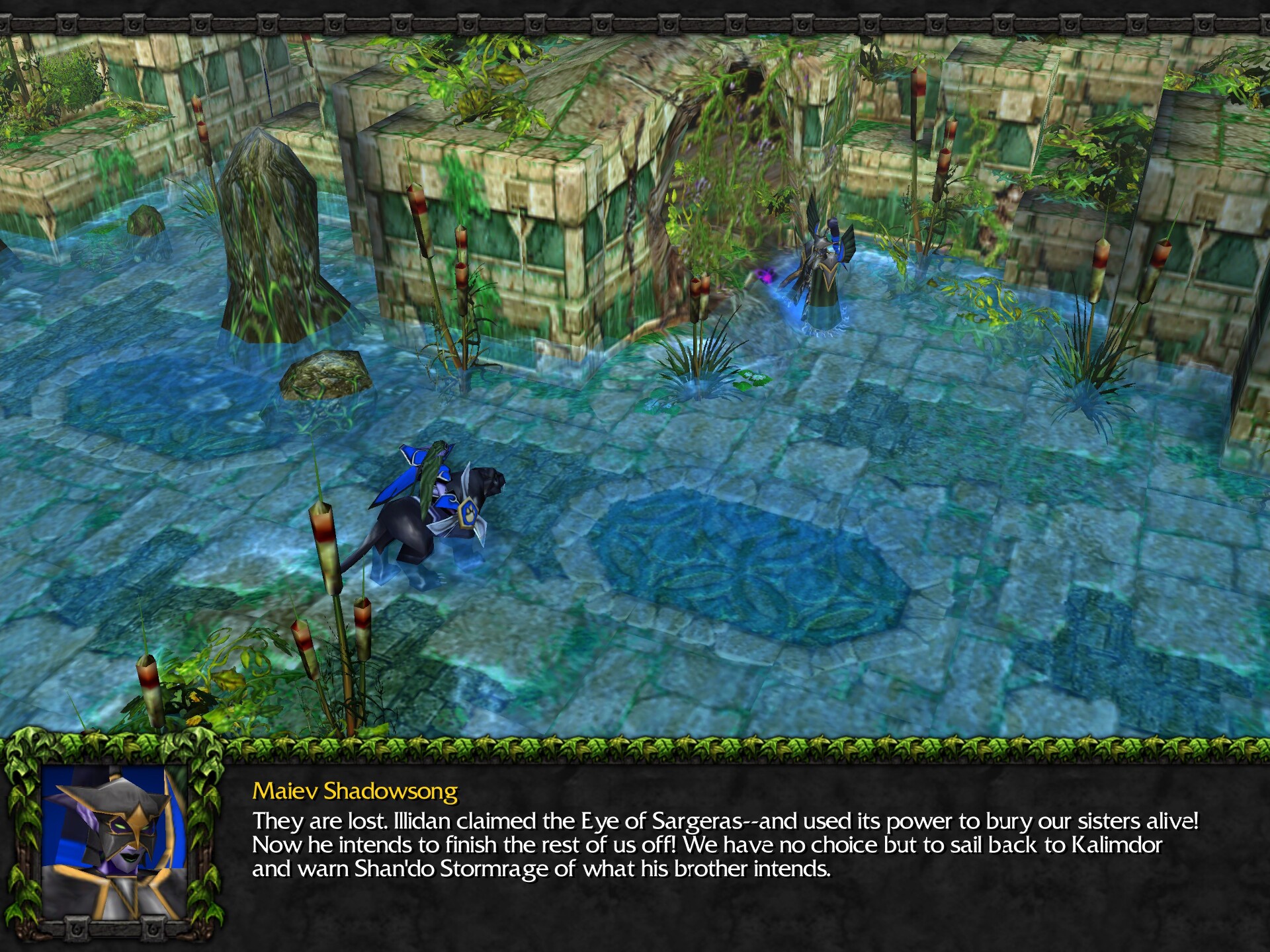
This is interesting because it establishes a few important points.
- Night elves have no kind of rapid remote communication that Maiev could use to contact the mainland.
- There’s nobody in more immediate vicinity whom Maiev could call for help. Nobody whatsoever. No druids. No tauren. No vrykul. No ghost elves. No Sundering survivors under a dome. All her hopes lie with Kalimdor. Have we established that? Good.
Maiev sends a single unguarded runner, whom the naga immediately intercept and are about to kill, forcing Maiev herself to step in.
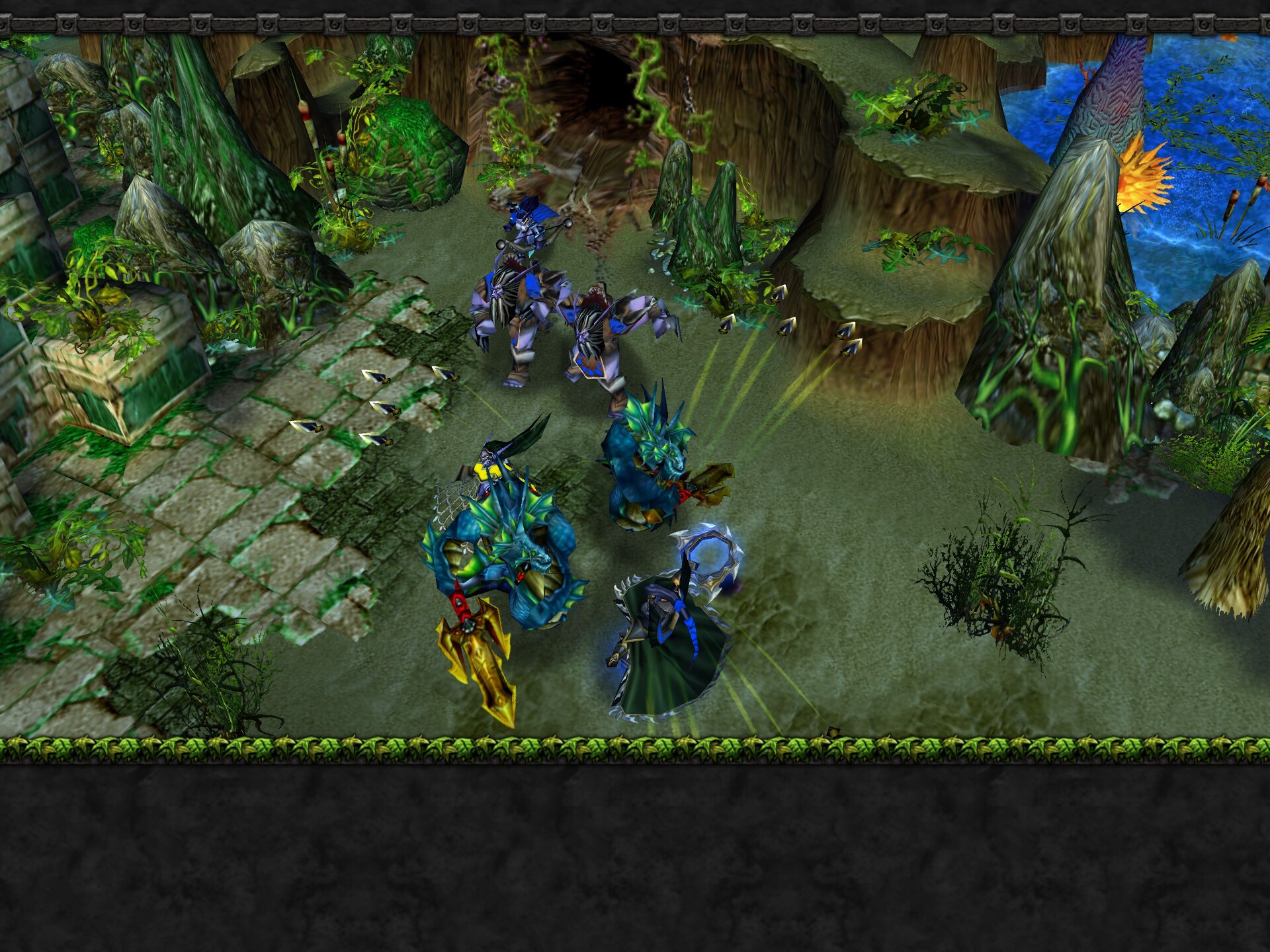
This is a hybrid mission, half baseless and half baseful. On one hand, you need to defend your base from two naga bases that attack from different sides. On the other hand, you need to put the runner on a ship and sail away to the northwestern corner, and you only have limited troops to protect her, as a cave-in separated them from the base. Only Maiev can move between the two forces, by blinking or via a Staff of Teleportation the player can find early on.
The base has only a single limited gold mine and there are no others available, so it’s not worth tarrying. We reach the shipyard early on, but now we have to actually navigate the waterways to the exit.
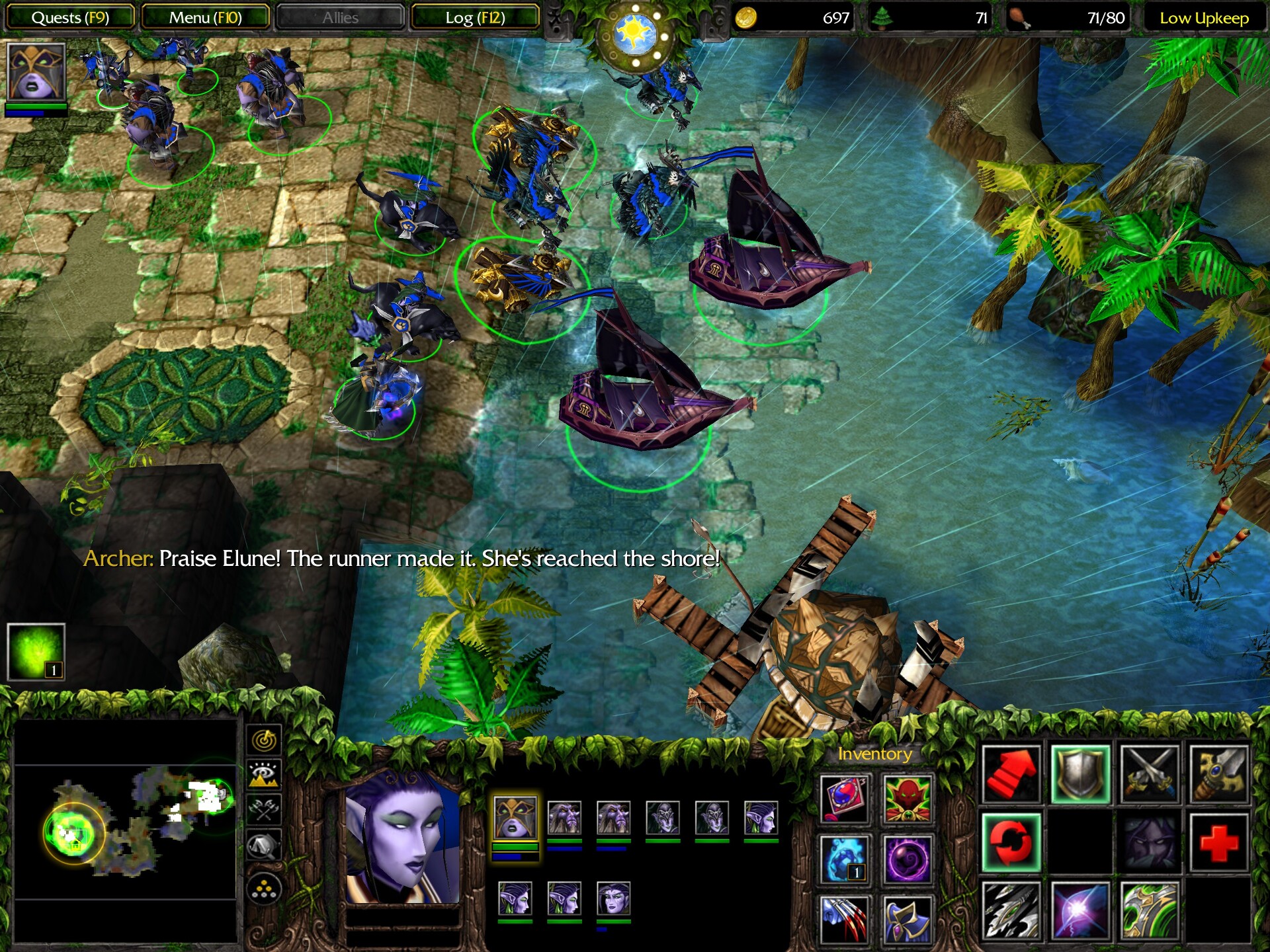
We cross the strait by ships, then disembark everyone except the runner and destroy the naga fortifications protecting the channel leading to the open sea, which is possible to do by land. Along the way, we encounter another map secret.
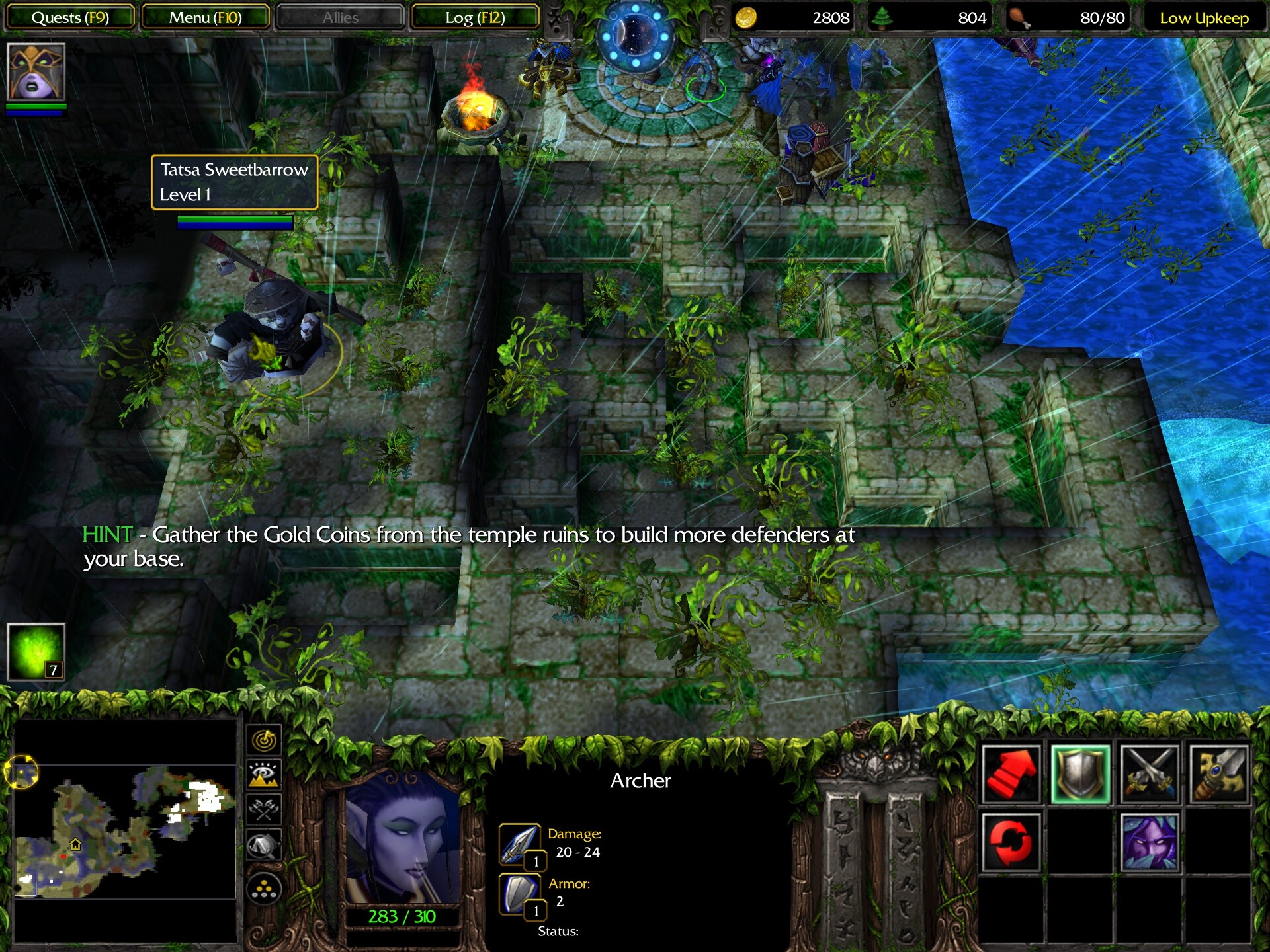
This pandaren brewmaster exits, stage left, as soon as Maiev blinks to him, leaving behind Slippers of Agility +3.
With the naga defenses destroyed, the runner’s ship reaches the exit.
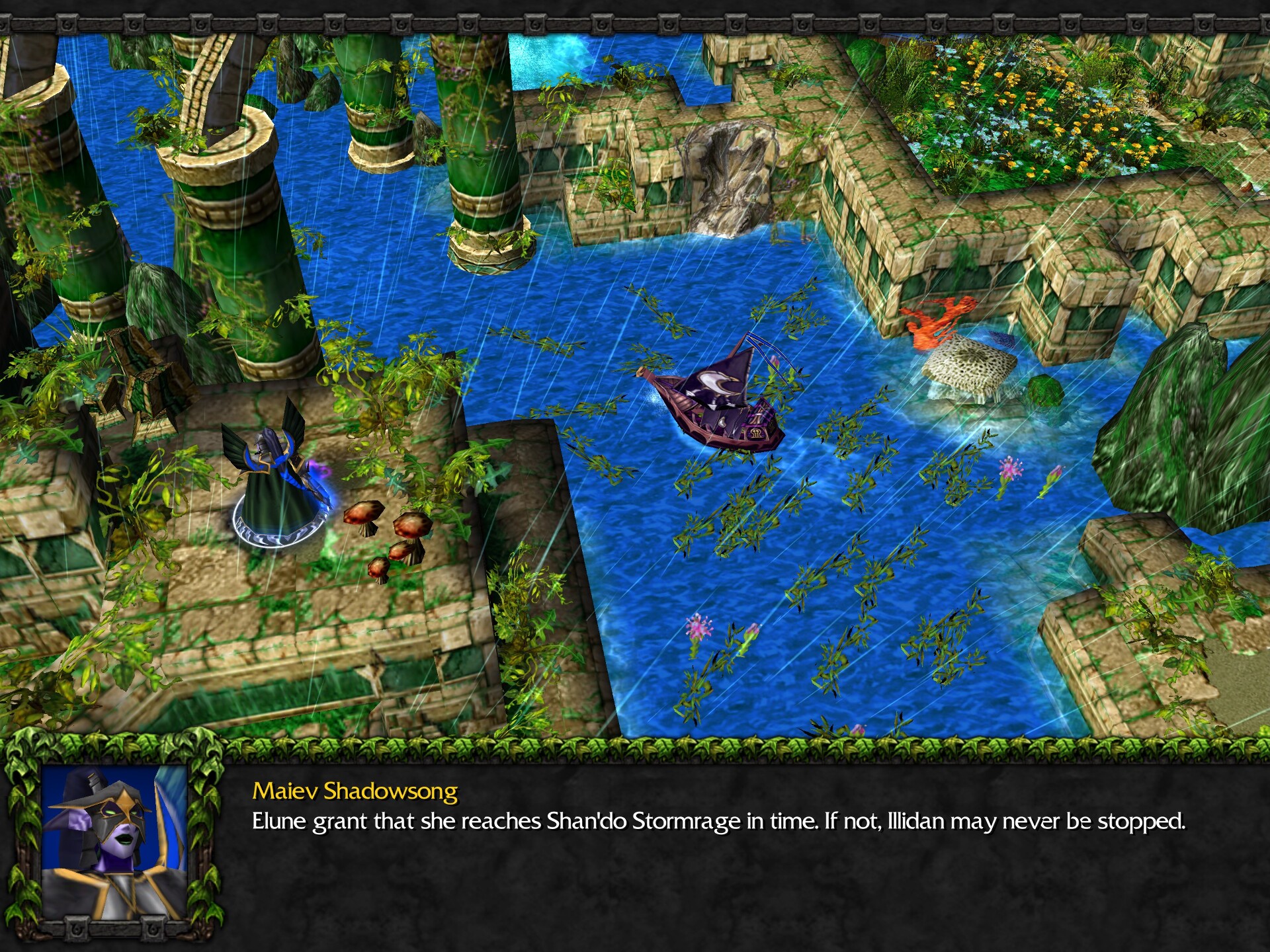
That’s it. A short mission. There’s a side quest with naga excavators digging artifacts, but with time being of the essence, it might be worth skipping.
One thing to note is that this is the mission where Maiev can learn her ultimate ability: Vengeance. Vengeance summons an Avatar of Vengeance, which turns nearby corpses into Spirits of Vengeance, which attack enemies with vengeance.4 This is reflective of the changed nature of Maiev’s quest. It’s no longer just about jailing an escaped criminal; he killed Naisha and the other Watchers. It’s personal now. Like Arthas before her, Maiev has gone from pursuing justice to pursuing vengeance; the distinction between the two, and the moral threshold that separates them, are among the running themes of Warcraft 3.
Unfinished Business
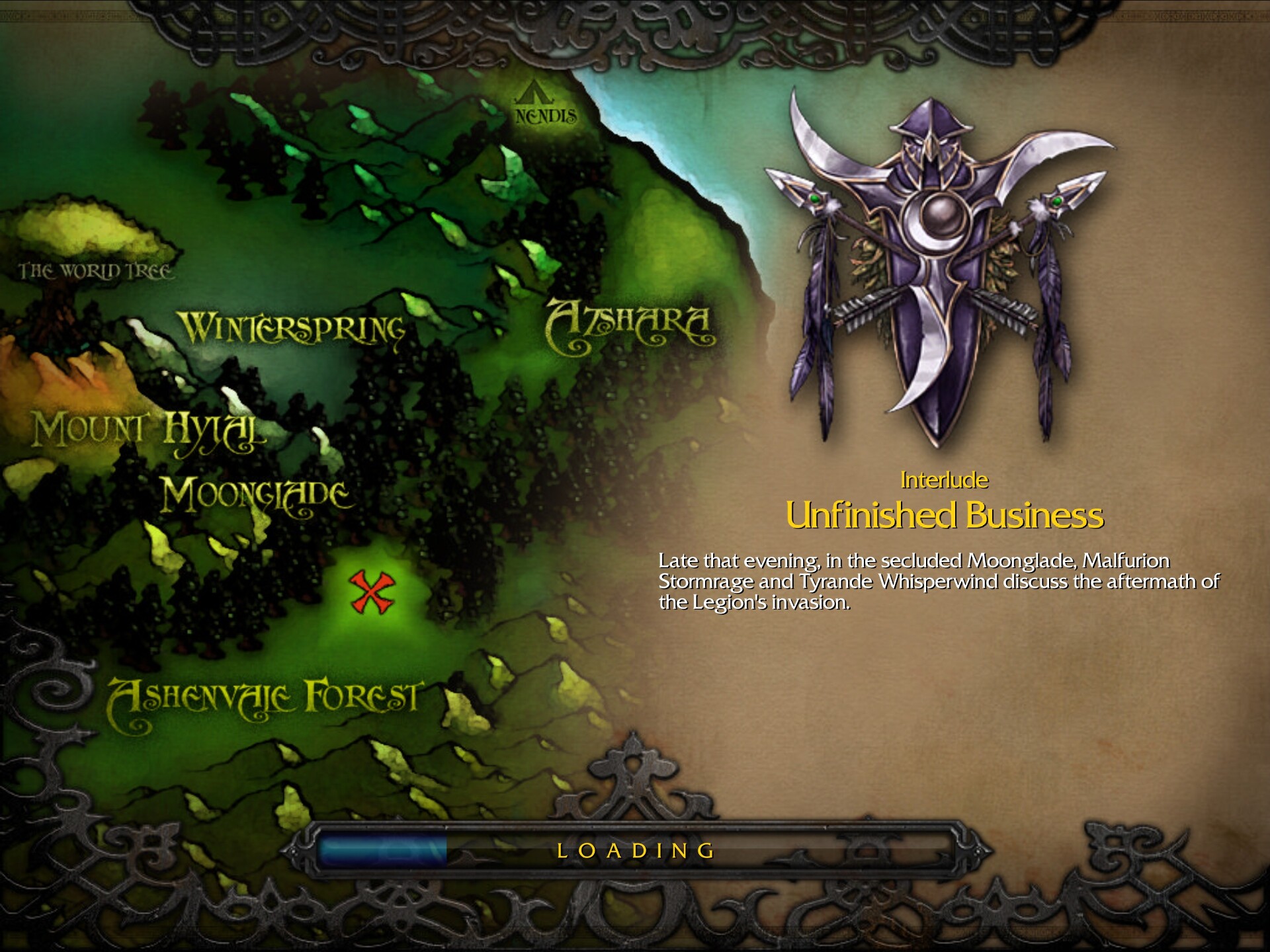
Logically speaking, at this point, Maiev is doomed. The most obvious thing for Illidan to do would be to forget about Maiev and implement whatever plan he needed the Eye of Sargeras for. And even if he decides to crush her first out of a sense of petty rivalry, there’s no way she can endure a full-scale siege long enough for reinforcements to come.
Consider this. The story has already established that the Broken Isles are a day of sailing away from the Kalimdor coast. The runner will have to sail back, find Shan’do Stormrage (wherever he is), possibly cross a great distance by land, then the reinforcements need to be mustered, rallied, and set sail for the Broken Isles, all the while Illidan’s naga are relentlessly assaulting Maiev’s remaining Watchers…
And in the process of forgetting all that, the story makes the world feel small — a recurring flaw of Warcraft storytelling.
At Hyjal Summit, near the roots of the World Tree, we once again see Tyrande and Furion… sorry, Malfurion.
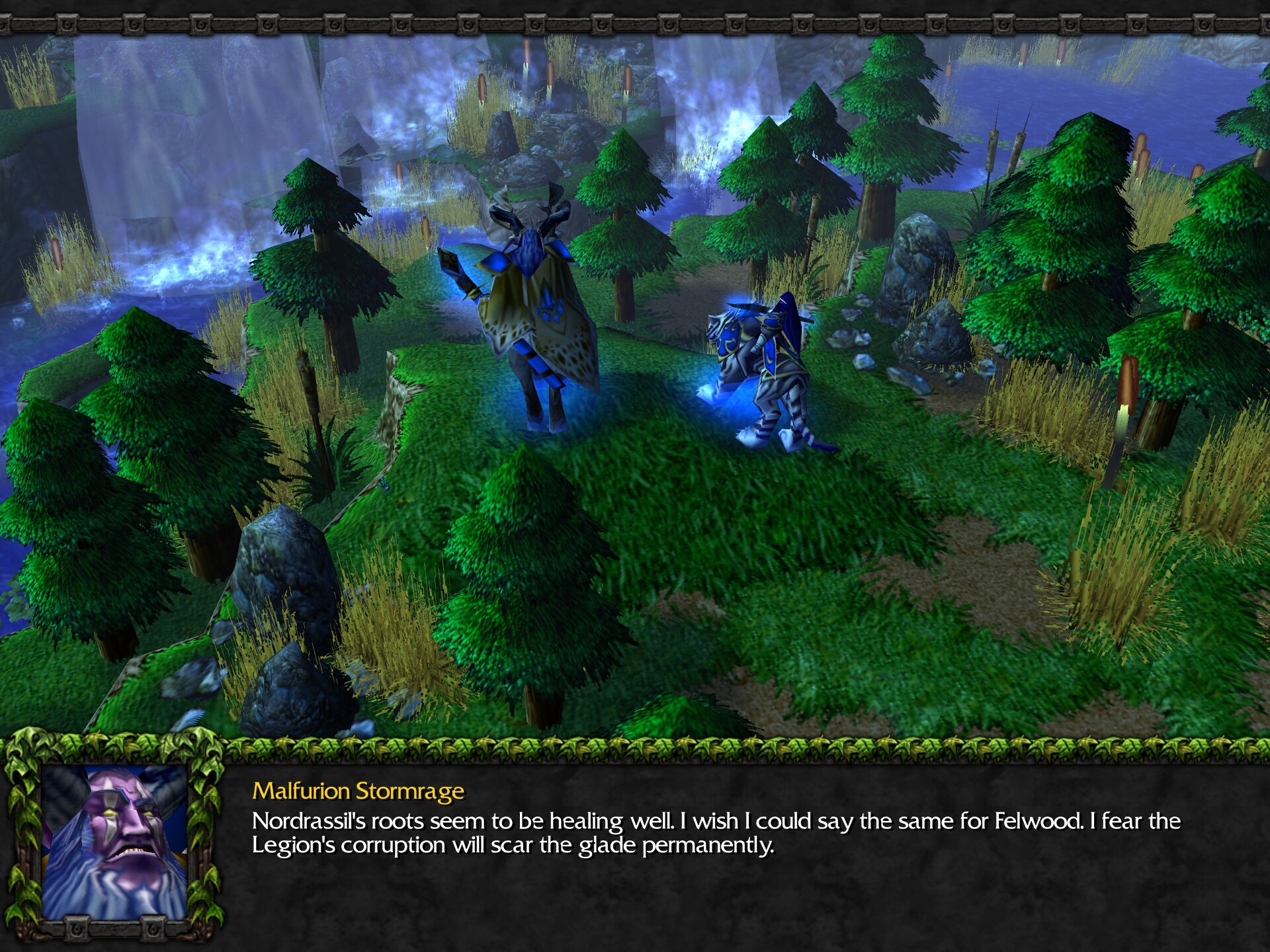
I was confused by this change of name at release. Not only is it never explained, but it’s a retcon, because from this point on, all Warcraft media will proceed as if his name is and has always been Malfurion. I can only guess this was another one of those lawyer-advised name changes, made because there was already a Furion in Warhammer Fantasy.
Tyrande thinks that perhaps Ysera or Alexstrasza could help with Felwood’s corruption. The conversation is interrupted, however, by the arrival of the runner, who apparently not only crossed the sea and half of Kalimdor, but climbed all the way up Mount Hyjal all on her own.
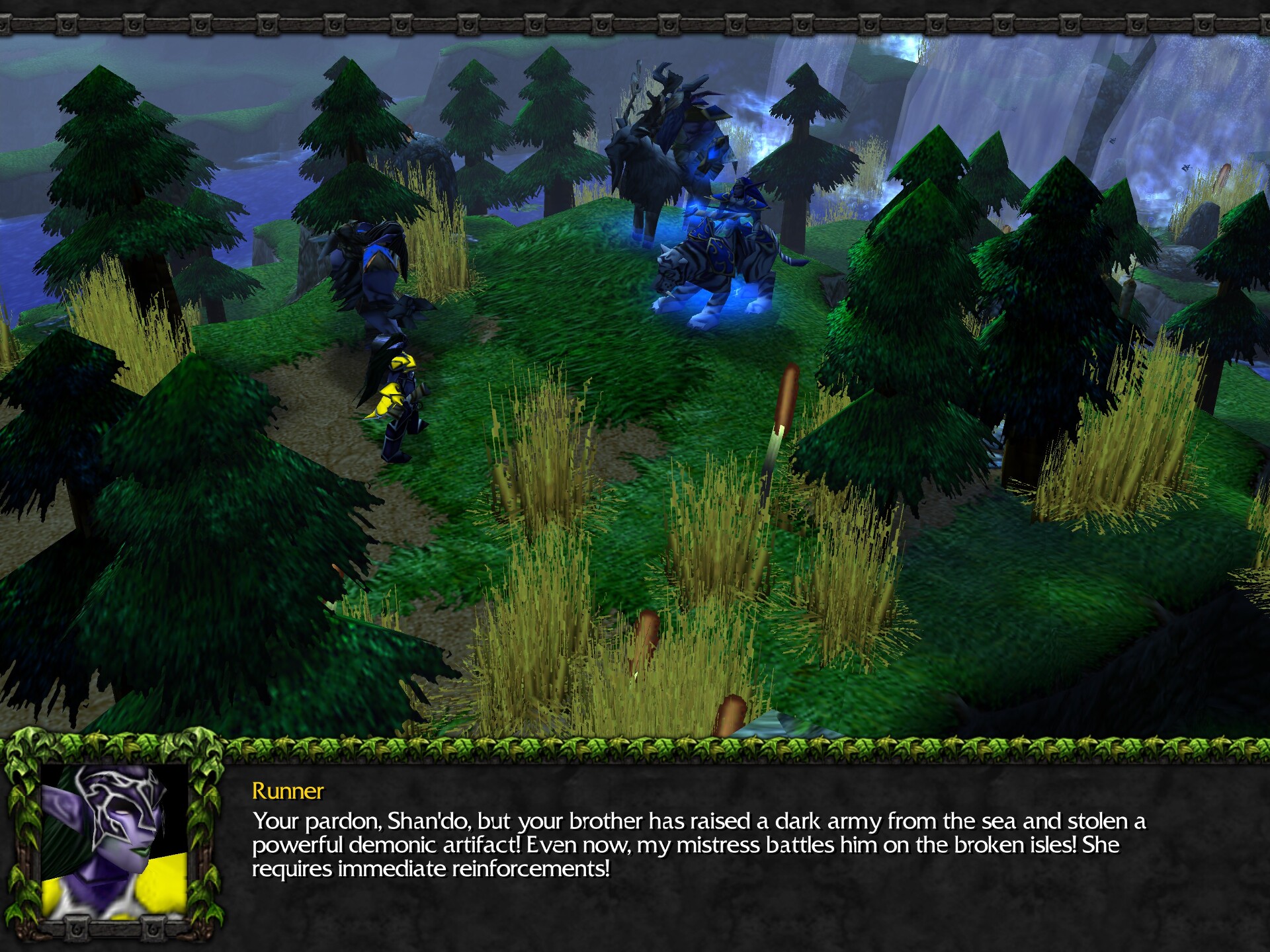
Tyrande and Malfurion argue over whether the Sentinels or the druids should help Maiev, with Tyrande saying it’s her responsibility because she was the one who set Illidan free. Eventually, they agree to go together.
Next up: the grand night elf expedition that left absolutely no trace in WoW!
-
The game intro, the prologue and human intro cinematics, and each campaign’s ending cinematic. ↩
-
Sindarin for “water-woman”, though this is likely unintentional. And like many locations from TFT, it’s nowhere to be found in WoW. ↩
-
And in lore, they were foreshadowed all the way back in Day of the Dragon. ↩
-
Vengeance. ↩
Leave a Comment